#and take away all agency and complexity and humanity from her
Explore tagged Tumblr posts
Text
free my complex female character, she did the same thing as complex male characters but the fandom takes Any analysis of her actions/choices/motivations that doesn’t strip her of all of her agency in bad faith and claims that only misogynists would dare to critique the things that they’ve noticed in her character because she’s a woman, completely ignoring the over-presence of discourse about similarly traited male characters in their fandom.
#exhausted by people categorizing CRITIQUE. not even genuine hate just literally basic analysis of imogen’s character#as a) hate at all but b) misogynistic simply because… they assume the person like caleb and percy uncritically like#i love imogen and i love her because she’s riddled with complexity that gives reason for her to be unlikeable#the shit ashton says makes me want to tear out my hair and i could write analysis on why but they’re still one of my favourite characters#i enjoy caleb but watching him infuriated me because of his self interest which is a coherent trait of his but is a tiring one#similarly with percy of love his pretentious Smartest In The Room shit but sometimes it meant he treated others more poorly than necessary#but i’m not unpacking all of that just so i have some fandom mandated right to say that i think there’s an aspect of a female character#that is imperfect in the human sense#because like. i will continue to call imogen’s self interested until the world burns and the moon shatters. because she is.#the only reason her choice to do good is compelling at all is because the choice to do otherwise is so tangible#it isn’t a Mistake or Fault that she’s self interested. it’s by design#like. she reaches towards the storm in curiosity in her sleep. but then she fights back when she’s awake#that’s it#that’s the dynamic. that’s what’s compelling#but no ur right fandom. let’s instead all agree that imogen is actually just intrinsically good#and take away all agency and complexity and humanity from her#and instead slap a sticker of Morally Good and enjoy the caricature of her where she’s made to fit into the imagine of#the latest aesthetic ad for diarrhoea medication#imogen temult#critical role#inspired as always by dumbass twitter posts that i’m subjected to because of school n work#the worst part is i do like the laudna n imogen dynamic in the stagnancy where it is but so much of that fandom is so clear in their erosion#of both characters actuality to suit the picture of Ship Tropes#like fuckin. so much of imogen’s fanart in imodna making her fat which as a fat person great love to see it#not so much when it’s clearly to make her short n stout against laundas tall n lanky.#anyway
246 notes
·
View notes
Text
One thing that really fascinates me about interview with the vampire (the show) is this sort of tension between power and powerlessness in all of the characters. Because it doesn't present becoming a vampire as something that just gives you power and magically makes you completely detached from all human concerns and struggles.
And that seems to be something Lestat does very much want to believe, and he's in enough of a position of privilege that he's able to convince himself it's true, and it's a fundamental area where he just cannot understand Louis because Louis CAN'T pretend even if he wants to. (And of course Lestat cannot ACTUALLY separate himself from "human troubles" the way he likes to think he can, he just has an easier time pretending than most). Because as much as becoming a vampire grants these characters supernatural power it doesn't just magically take away the very tangible human ways that they were previously vulnerable or powerless.
Becoming a vampire doesn't negate Louis' struggles with racism; in some ways it amplifies them with how he is alienated from his own family and community; his closest connection becomes Lestat. He loses his economic independence and becomes socially dependent on Lestat in a way he wasn't to anyone as a human because in some ways becoming a vampire made him MORE vulnerable, despite granting him physical strength/speed/etc. The promise of freedom in vampirism Lestat presents to Louis (that I do think he does genuinely mean, but "freedom" means very different things to Louis than it does to Lestat) is never fulfilled.
Likewise Claudia learns the hard way with Bruce and later with the coven that she may be a vampire but the world still looks at her and sees a vulnerable young black girl and that will always put her in danger.
Claudia rescues Madeleine then turns her into a vampire, but rather than protect her from future harm the "crime" of turning her becomes the very thing that gets her killed by yet another angry mob.
And 514 years as a vampire will never be enough for Armand to truly trust or believe in his own power. Because the first 200 or so years of his life he was literally never once allowed any agency at all over his own identity or his own body (child slave sold to a brothel, sold to an abusive master, captured and violently indoctrinated into a vampire cult for centuries). No amount of material strength and power is going to undo the psychological effects of that. (And I know some people like to read his frequently passive demeanor as simply manipulation and a way of catching people off guard (because how could someone so old and powerful possibly feel a genuine sense of fear/vulnerability/etc 🙄) but to me that's an incredibly disingenuous reading of him. But that's a different rant for another time!). Being a vampire does not save him from being horrifically abused, nor does it save him from the lasting emotional effects of that abuse.
And I think there's something interesting to be said about the way that, in order to survive safely, they have to feed on the most vulnerable members of society (people undesirable and therefore least likely to arouse suspicion) in order to go unnoticed. If they want to live they have to prey on those vulnerable in possibly the same ways they themselves once were (and in many ways still are).
There's a frequent argument I dislike that we shouldn't be viewing any of these characters through too human of a lense because they're literal monsters (to be honest it's an argument I see most often made when people simply don't want to talk about the show's complex depiction of racism/misogyny/abuse/etc and used to dismiss those as issues "too human" to be relevant to a story about a bunch of monsters with a supposedly alien sense of morality), but I think the show itself makes a huge argument that for these characters there is no escaping or separating themselves from the very human struggles and vulnerabilities that marked them before they ever became vampires. It's like a sort deconstructed power fantasy.
#interview with the vampire#louis de pointe du lac#armand iwtv#claudia iwtv#lestat de lioncourt#madeleine eparvier
256 notes
·
View notes
Text
Let's get into...

Look, at the end of the day, writing is word choice. You're choosing which words to put in what order to make other people feel Some Type Of Way about the result. But there are 4 bits of advice perennially swirling about the bowels of writing forums that, misapplied, might make you shit the metaphorical bed of optimal communication, and I very much don't want that for you. I'm staunchly pro-avoiding the literary runs, in fact. So let's get into how.
On the chopping block today is my nemesis:
"Cut all adverbs"
I'm not going to pretend that I don't know why this advice exists. All two reasons it exists, even. Let's break them down:
Too many adverbs: we're all guilty of inundating sentences with adverbs. There are many moving components to scenes, and there's often a desire to express every last one of them. It's not enough to say that the ball rolled down the empty street; the reader simply must know that the ball crept exceedingly slowly, cautiously inching downwardly and toward the eerily empty street. But see, that's clunky. It doesn't flow well, doesn't add anything that couldn't have been expressed more concisely through better wording, and, most importantly, it insults the reader's imagination. By overexplaining, you're taking away their (admittedly limited, but crucial!) agency to picture things themselves. Womp womp.
Redundant adverbs: pretentious people have invented far too many words over the years for anyone to be out here saying "ran quickly". Running is inherently quick, my guy. Otherwise, we'd be saying walking or jogging or promenading (yes, really). This is the moment to break out the thesaurus and realize that sprinted, raced, and dashed all say what you wanted them to say and bring an evocative, nuanced vibe to the sentence. And nuance is tasty. Nuance is the sauce that the quirked up white boy (the sentence) was goated with. So we're better off just saying "ran" and saving that adverb for when it's actually trying to communicate complexities, which we'll expound on once we get into why adverbs are hot, actually.
NOTE: this crops up particularly often in dialogue. "Said angrily" is a dialogue tag that may seem inoffensive — until you remember that snapped exists, and furthermore, so does slamming the door in their face.
So then when/where in the annoyingly nondescript hell should I use adverbs?
Fundamentally, when they add meaning to stuff. To elaborate:
Substance: a sad smile is different from a regular smile, and should be described as such. If you just say "they smiled", people will assume it's a "normal" (i.e. happy) smile and call it day. If someone almost smiles, it's also telling us something different than if we'd said that they didn't smile at all; now we can't tell that they found the joke funny but chose not to smile, and the interaction loses substance. (Moreover, waiting and waiting patiently aren't the same thing, as I'm sure your mom pointed out when she still told you off because you "gave her attitude" by breathing too hard while you waited for her to press play on the VCR.)
Pacing: someone shaking their head slowly is different from them shaking their head at regular, normal human speeds. The latter is simple negation, whereas the former has an element of emotional nuance, of why the hell did they do that that way? Was it anger or regret? Denial, maybe? No idea! But now the reader gets to ponder about it, and that's where interest is born, methinks.
Tone: there aren't too many ways to interpret someone saying "I hate you". It's a pretty straightforward phrase, for the most part, deployed with devastating expertise by schoolchildren whose parents won't give into capitalistic fads and buy them a Stanley cup. But if I were to say "I hate you" softly, then ah. Things change. We have contrasting emotions now. Depth. Is it really an "I love you" in disguise? Am I just mad that you're making me order at the counter when you know I get, like, weird when I have to ask them for no pickles? Perchance. The takeaway here is that the adverb made it so that you can't take the sentence at face-value, and that, unlike pickles, is very satisfying.
The other 3 horsemen of the misconstrued writing advice apocalypse (word choice edition) will be coming soon, so please keep an eye out for seals breaking on ominous scrolls. Happy writing!
39 notes
·
View notes
Note
For the character ask game, what are your thoughts on Chuuya?
…Ima say it now this one’s gonna be long.
Favourite thing: The way Chuuya knows how people perceive him and uses it to his advantage.
In Fifteen he knew that Dazai saw him as a loud brainless teen so he played on that to hide Arahabaki while actively helping to search for him.
And it’s in that same way that he tricks Fyodor.
Least Favourite thing: He does leap before he looks at times. Truly the world’s worst interrogator.
Favourite line:
“You’ve fucked up Detective Agency”
What can I say? It’s Iconic.
Also not a spoken line but when he’s being interrogated in Stormbringer and when it seems like he’s gonna confess. He just calmly hands over a note that just says “eat shit.”
BrOTP:
Chuuya and Kouyou because they are siblings to me. He looks up to her and she threatened to tear Verlaine limb from limb for trying to take him away.
Chuuya and Kenji because I’ve seen the I believe wan panels of them hanging out and it’s adorable and I love them being friends.
Chuuya and Akutugawa because Chuuya referring to him as “our boy” warms my heart. Akutugawa respects him and there little moment at the end of Dead Apple is so sweet.
Chuuya and Rimbaud because he did make an impression on him and despite it all Chuuya still wears his hat.
Chuuya and Adam are everything to me. Their whole relationship and how Adam cares so much for him so openly and how Chuuya’s terrible at showing he cares for him too.
Chuuya and the Flags. He’s like a really pissed off stray cat that they’ve all just adopted. I love his relationship with them all and how much they care about him and accepted him as one of them.
Chuuya and Dazai. Platonic or romantic (tho I prefer platonic) whatever they are, they are fundamentally intertwined and mean a lot to each other (begrundingly) and I love them being the smartest and dumbest people in the room together.
OTP:
Chuuya and Kunikida. Similar personalities and roles in their organisations. I feel they’d both respect each other and they’d find common ground and be very cute.
Also bitch about Dazai and gang up on him but that’s just a small part of all of this.
Chuuya and Atsushi. Similar backgrounds and abilities. Chuuya’s part of the reason Atsushi proposed an alliance to begin with. They both struggle with their humanity and I feel would reaffirm it in each other and be very cute.
NOTP: I don’t really have any.
Random headcanon: Because the Sheep were technically banned from Yokohama (being PM terrority) Chuuya knows multiple routes into the city that they aren’t aware if.
Along with secret passages into the PM building.
Unpopular opinion: Chuuya is a character that exists outside of Dazai. He is an incredibly complex and smart character and more than just the “brawn” of their duo.
Song I associate with him: What’s up Danger by Blackway and Black Caviar.
Favourite picture:
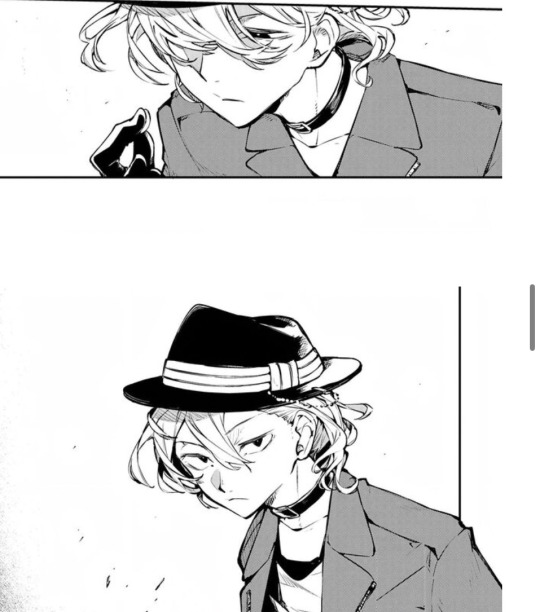
The unimpressed low-key ethereal look of a man that is so earning every single yen of his paycheck.
41 notes
·
View notes
Text



DYNAMO | Steve Rogers x Reader | part 8.
HYDRA has made their share of human experiments. You're just one of them. One of the least successful ones. One of the least functional ones. At least your life in the facility gave you a few things: unwavering resilience, cool(ish) superpowers and a great sense of humor. Steve Rogers would strongly disagree with that last one. A single chance encounter with him reluctantly brings you into the Avengers Compound, and you're determined to make his life as miserable as you can. Feeling's mutual.
AO3 | Masterlist | Playlist (coming soon!)
notes: Denial is a river in Egypt. (warnings: mentions of human experimentation, unresolved feelings, YEARNING, protective! steve) (5,039 words)

8: GRAVITATIONAL PULL
Steve Rogers, as it turns out, is one fucking sore loser.
So far, he’s been fine and dandy kicking your ass during close combat training, with an unchanging score of 10-0 every single time. This is the only time this week that you spent more than 5 minutes in the same room. It’s been so peaceful.
You’re 8-6, you were promised a break once you’ve gotten him to say “fold” a 5th time, but here you are at round number 15 with no signs of stopping. All because you’ve started to learn to redirect the kinetic energy (Bruce taught you that) of his blows into your own movements, finally standing at somewhat equal level during fights with the super-soldiers.
“Rogers—” You nearly snarl as he slams you down on the mat, trying to get his attention again by punching his bicep. “I need a fucking break. We need a break.”
He doesn’t seem he’s listening, so focused on beating you he doesn’t even answer you right away. With an exhale he releases most of the hold he has on you, despite not disengaging immediately. You tell yourself the weight of his body bothers you, and tap his arm again.
“Sorry,” He mumbles, rolling off from on top of you.
“God, finally.” You manage to finally get up, reaching up for your water bottle. You’re spent. You might not even have the energy to argue with him this time. “What’s going on?”
Steve doesn’t even look at you. It’s like he can’t, and normally you wouldn’t care about whatever is troubling him. But like previously stated, things have gotten… complicated. Complex.
“They want us back on the field. I’ve been trying to delay this as much as can, but the missions are piling up. Hoss’ visit last week was his first warning.” You don’t really know what he’s means about warning, but he doesn’t explain. “I’m just… I’m distracted. Stressed. ”
“So you took that out on me? I’m not your fucking punchbag, you asshole. ” You complain, putting your hands on your hips. Steve is looking up at you, bracing his hands on his knees. You make sure to demonstrate zero sympathy. “What exactly are these missions?”
“The kind where the U.S. Defense Department should be deploying his military, but sends us instead.” Natasha pipes in, hopping down from her treadmill. “To fight for the country’s imperialistic affairs instead of everyone’s benefit.”
Steve nods.
“The Avengers are supposed to take care of international level threats. Aliens and terrorists, not a country with different interests than theirs. And because of the Sokovia Accords, we don’t have agency anymore. Not even me.” Steve says, and your jaw goes slack.
“Making us mercenaries.”
“Government-issued mercenaries, pretty much. Orders are orders,” Nat complements.
“This is such—”
“Bullshit, yeah.” Steve runs his hands through his hair, and you share a look with Nat. You’ve never seen him like this. Maybe she has, although she seems just as stunned as you are right now. “They want you to go, too.”
“Okay? I’m not stoked about it, but I’ll go,” You shrug, but he doesn’t seem satisfied.It’s surprising they want that considering how the last mission went - but you figure a faulty super weapon is better than nothing. It’s an awfully familiar feeling.
He gets up, rolling his shoulders back. You can almost hear the tension making his muscles snap. “I’d rather you not be involved in any of this. None of you, really.”
Nat rolls her eyes. “Drop it. You play the martyr enough, Cap.” You have to agree. And he’s incredibly annoying for it. “But he’s not wrong, Sparky. The less you put yourself under that HYDRA training of yours, the better.”
It’s your turn to roll your eyes. “Not you too! I already said I’m fine.” You sigh, pinching the bridge of your nose. “It’s not exactly a fun time, sure. That’s why… I’ve been considering setting up an appointment with Shuri. Also, HYDRA can get fucked.”
The confession makes Steve breathe out, like a cloud has been dispersed. He nods at you and you point a finger at him.
“No promises— just one day, one check-up. It’s good that you’re both here, actually.” You inhale, preparing yourself to ask the question. No better time than now, you suppose. “I want to talk to Steiner again. This motherfucker knew all about stuff I didn’t even know I could do and is apparently my only source of knowledge about myself. I need some answers and I was wondering if you two could go with me? I doubt Fury will clear me to go there again, with or without company, so—”
It’s Nat who cuts off your rambling. “So you want someone to go against Fury’s orders with you.” She tilts her head.
“Basically, yeah. Well, not really orders. Advice. Principles?”
“I’m already there, babe.” Nat has a smirk on her face.
You breathe a sigh of relief, then bite your bottom lip when you look at Steve, with his hands on his hips and concern on his face.
There’s a phase of Steve Rogers’ you’re nostalgic about without ever experiencing it yourself: when Bucky Barnes was revealed as the Winter Soldier and he went against everyone and everything because he believe in his best friend. That confidence.
That faith.
“Look. I know you’re Complacent-Cap right now, but—” “I’m in.”
Oh. Okay.
“Alright. Cool. This might— I mean, if it works, one less problem for you, huh? And just for the record, there’s other ways for you to relieve stress that aren’t wrestling me, you know?”
You blink once you realize how your sentence sounds. Steve blushes. You can feel your cheeks getting warmer, too.
Is Nat still here?
Jesus Christmas.
“Not that I’m offering any of… that. I’m not.”
Steve clears his throat, rubbing the back of his very pink neck. Thankfully, Romanoff saves the day. “Come on, Sparky. Let’s hit the showers.”

Can’t come with: distracting One-eyed Eagle. Don’t do anything too stupid. x
You stare at the text as if Nat is going to reply with a Just Kidding! But the cold at the pit of your stomach confirms this isn’t a prank - it’s very unlike Natasha Romanoff, too.
“She’s not coming.” You tell Steve, furrowing your brows when he nods.
“I know. Last minute meeting with Fury. She can still buy us time, though.”
Great. They both knew about this in advance, and Natasha decided to tell you one single minute ago because she knew you’d want to postpone your visit to Dr. Steiner.
Now you have to share a Jeep with Steve Rogers.At least it’s a car, and not his Harley. You don’t need that extra edge.
He gives you a full body check before leaving, but you don’t need help with your seat belt this time. The silence is as loud as the bike’s rumbling, though.
You hate it, as much as you hate how his jaw is set and focused while you’re fidgety and restless.
You didn’t think you’d come to regret your escapade with Steve Rogers, at least not like this. Things have been different since then. If you walk into a room, he leaves it. Distant. Or he doesn’t, then he’s gentle and warm. It’s fucking confusing.
The radio becomes your first attempt at a distraction, skipping stations and messing with the volume dial until your anxiety is hopefully muted.
His eyes flit towards your hand once. Twice. “Can’t you just pick a station?”
“Nothing’s calling to me.”
“Then just turn it off.”
You huff, harshly turning the dial until the radio went off. “I guess a silent, awkward car ride will be good. It’s a good change from the anxiety,”
With arms crossed against your chest you turn to the window, watching the trees speed by in a blur of green. It’s nice out here, upstate. It would be nicer if this road trip was in fact a road trip and not you walking head first into a mousetrap.
On your peripheral, you see him tighten his hold on the steering wheel. “Why is this awkward?”
“Oh, please. Don’t act like you haven’t been avoiding me like I have the boils.”
“I’m not avoiding you like you have the boils.”
You scoff. “This is why I wanted Nat. We jumped each other’s bones once and you can’t even—”
“Jesus, why do you have to say it like that?”“—be in the same room as me!” “We trained together yesterday.” And it still felt like you weren’t even there. “Yeah? How about the past few weeks?” “Do you even want me around?”
You want to throw something at him. Your boots would do, if it lacing them up wasn’t so much work. “No.”
“Alright. Then why does it matter if I’m avoiding you?” “Oh, so you are avoiding me! Finally.”
He runs a hand through his hair. “I thought you hated me.” “I do. But this is making shit worse, Steve.”
“How?”
“It’s making it weird.”
“God, you’re impossible.” Steve sighs. “…I told you I wasn’t good at casual stuff.”
You can see the silhouette of the confinement facility approaching. Maybe it’s because you were pushing his buttons, but Steve has been pushing the pedal: you don’t remember the ride being this short, last time.
“Rogers, we’re adults. That didn’t change anything, and it doesn’t make things between us casual.”
“Doesn’t it? You act very casual about it.”
You scoff. “It was one time, and like you said that day, it’s not happening again. I don’t care that you regret it.” He exhales, and since you’re looking right at him you see when his throat bobs. “That’s not— I don’t—”
Your eyes narrow, stopping him right before he starts the “it’s not you, it’s me” bullshit. “So don’t worry about hurting my feelings or whatever, okay? I’m not catchin’em.”
He’s silent for a long time. Long enough for the oppressive concrete building to be right in front of you now: you’ve arrived.
His eyes are ahead as men carrying heavy firearms approach; you hate that you can identify the exact model. Heckler & Koch. German submachines. Quick-firing, nasty little things.
“You got it all wrong, you know.” He says quietly, looking at you finally after identifying himself at the gate.
The words make you frown. His eyes are softer than you anticipated, and his fingers twitch over the steering wheel.
There’s a knock at the window. The guard gives Steve a nod. “Welcome back, Captain Rogers.”
Oh yeah. You’re seeing Steiner today. Right now, in fact.
This has been a decent distraction, all things considered.
Your legs feel like jelly as you climb out of the car. Blood roars in your ears as you walk inside the prison, tailed closely by Captain Rogers himself. His presence at your side makes Hermann Steiner raise his unkempt grey eyebrows.
“You’ve brought in a friend today, Fräulein.”
“Hardly.”
The mad-doctor shakes his head, amused. Rogers is outside the visitation room, leaning against the wall too lackadaisically to be anything but intentional. You know he’s coiled tight and ready to snap, if needed.
“Did you watch the little video I gave you?”
“Yes.”
“And I take it you’re making use of your - our - secret ingredient? You look much better than last time.”
You dip your head.
Of course, he’s not wrong about that. It was his plan all along, and as far as he knows, everything is going according to it. You’re back, right in front of him again.
“That’s why I’m here, actually.” Your leg is bouncing. “It’s not really a secret anymore - and I found someone that can wipe it right off me. Isn’t that great?”
The doctor’s eyes widen, and he moves as if to reach for you if he wasn’t restrained in the chair. “You cannot do this!”
“It’s not you, it’s me. Yadda-yadda.”
“You have no idea what you’ll unleash - your powers, you - were not made for this. Believe me when I say you need everything that is within you. The way your body reacts when you use your skills, the threat of shutting down— it is all by design.”
“Here’s the thing: it’s not just when I use them. It’s killing me, you fucker.”
He looks down, having the nerve to look sad about it. “It is necessary.”
“You don’t know that.”
“I do, Fräulein— I do. I made you.”
“What, from clay?”
“I am a mere geneticist, not a sculptor. No, dearest. Your DNA was engineered to be HYDRA’s perfect weapon. Every weapon needs an off switch.”
Engineered DNA. If there was ever any hope you were anything but Frankenstein’s monster, it had been squashed under Steiner’s government-issued rubber clogs.
When you say nothing, he continues: “Indeed these symptoms should not be happening when you’re not manipulating energy, but I suppose no experiment is predictable.”
Your lip twitches in disgust. “You knew I could do more than just electricity.” He perks up in his seat. “I was not exaggerating when I said I made you, Fräulein. Von Strucker too arrogant to believe I could create such power… too cautious to allow you to truly bloom. But look now: that brief conversation of ours and you have already grown to such heights.”
“Oh, you’re not trying to take the fucking credit for this.” You have to grip the seat of your chair to keep yourself from lunging at him.
“Think of what you could achieve under my guidance. Get me out of this cage and you’ll see the glorious future we could make… shaping the world as we see fit.”
“You’re so desperate it’s sad. You want me to break you out for what? So I can go back to being your guinea pig? Your weapon?” You scoff, crossing your arms against your chest.
“Is that not what you are?” “Shut. Up.” Steiner smiles. It makes you sick.
“You were not designed to function on your own, dear girl. You must accept this truth.” There’s heavy dread at the pit of your stomach, weighing you down further with every word that comes out of his mouth. “Like it or not, you need me. You were born for the use of HYDRA.” “Trust me, I’d let my brain implode before I see you wearing a lab coat ever again, Doctor. The cell bars suit you better.”
“Fräulein, Fräulein…You’d risk the lives of all of these people you seem to care so much about? You have no idea the damage you can cause without strict control.”
“Do you?”
He hesitates for a second. And it’s enough: the things he’d revealed throughout your conversation made it seem like he also didn’t know the full extent of your powers. Did he even know about Joule’s Principle? How much of his knowledge about you was confined to simple theories and speculation?
“I’ve seen the news, about Union City. You think that was a simple miscalculation on your part? An accident? I wonder if your little Avenger friends will see you any differently when one of them becomes a casualty.”
You get up abruptly, eyes searching for Steve Rogers on the other side of the glass. He’s not there. You blink, wetting your dry lips with your tongue. You never wanted less privacy than in this moment.
“Do not forget my words, my dear. I know what I created. You are smart, despite all your poor decisions. ”
“Fuck you, Steiner.”
He’s about to open his mouth when the door slams open and Steve walks in, flanked by two armed prison guards. They take Hermann Steiner away, but his smug smile remains in the room with you.
You’re still looking at the empty chair when Steve murmurs your name.
You have to swallow the involuntary sigh of relief that comes up when you look up at him. “How much did you hear?”
He rolls his shoulders, as if to shrug away the tension before answering.
“Enough.”

The ride back was also silent and tense, but in a different, heavier way. You almost wish you still had it in you to keep on bickering with Steve about the nameless thing you had going on.
Steve had slowed down the car once a message from Fury had come in, Natasha’s bought time run out at last.
You both, my office. No detours.
His effort was commendable, but your hands were clammy as you recalled the conversation at the prison, chest tightening with each mile you got closer to the compound. Dr. Steiner’s words simmered inside your head. When one of them becomes a casualty. When, not if.
Nick Fury’s office is dark and imposing, with a security system rival to the Pentagon. At least you assumed. He gestures for you to take one of the leather chairs in front of his desk but Steve chooses to stand, hovering behind you like a concrete wall. Fury gives him a brief glare for that.
“I was under the assumption your stay at the compound was to rehabilitate you from HYDRA, not to make family visits to them.”
“That piece of shit is not my fucking family.” You feel Steve shift at your back, but you can’t bother with censoring your words right now. “If you’re so against HYDRA, why do you want me to use the programming they gave me? You saw the video, you know who used to train me.”
“You know better than anyone that can never work, Nick.” Steve adds, and your lips purse. “Bucky thought he was hopeless but he’s been doing better. It can be the same for her.”
Fury sighs. “This isn’t all just up to me, Cap. We’re all making concessions here. Not just you. This place is balanced precariously on top of what S.H.I.E.L.D., S.W.O.R.D. and the government wants and what you - we - think it’s the right thing. One slip and it all crumbles.” He knocks over a decorative pile of blocks to get his point across.
“I insisted for her to consider the deprogramming. This was on me.” You frown at Steve, and he nods back at you.
“I’m sure it was, Cap. And that’s exactly what I’ll be putting on the incident report.”
You hate the politics game, and you hate yourself for walking willingly into it. Now you’re too tangled into it to walk out. One wrong move, the wrong piece removed, and everything collapses like a stupid game of Jenga.
“Do you understand my job here now, recruit?” The way he refers to you make you blink, your attention on him fully. You nod weakly. “The Sokovia Accords are still in effect. Rogers breaks them, it’s a misjudgement; he’s a war hero. You break them, you get a ticket to the Raft.”
“Fury.”
“You’ve already threatened me with that.” You say, taking one of the little blocks and flicking it away. “You wanna lock me up? Do it. I’m done taking orders and being a good little tool for some ruling power to use. The US of A, Nazis, whoever.”
Fury follows the block, shaking his head.
“That’s the thing. I could do it: I don’t want to have to. But I need you to cooperate. S.W.O.R.D has interest in you, and that gives you some leverage.” You roll your eyes. “For now, anyway. You’re on thin ice, Sparky.”
“Don’t call me that. And I’m pretty sure this is carpet.”
He leans back on his chair, opening his arms in resignation. Still, his point was not completely off. You’re sure he knows that, and that’s exactly why he’s letting you have the last word.
You and Rogers walk together to the elevator. He lives one floor above you, and now you’re thankful the Compound is large enough to help you avoid each other. You’re not sure you can make a sensible decision when he’s looking at you like that. Because it makes you feel safe. And that is very, very dangerous.
One strike, you’re out. You could either conform and be exactly what the people you despise want you to be or set yourself loose, becoming what they already think you are. A weapon of mass destruction in both outcomes. No matter which path you went on, you had a feeling that it was only a matter of time until disaster struck anyway.
You were born for HYDRA to use. I know what I created.
Now you’re close to being something S.W.O.R.D. could use.
Steve stops the elevator from closing once it stops on your floor. “I won’t let them take you to the Raft. Whatever you decide.”
You let out a breath, glaring at the ceiling before turning back to him with your eyebrows raised. “Are you sure? A few months ago you’d fly me over personally.”
He shrugs. There’s the danger.
“Promise?” Your voice is softer than expected when you say it.
“Yeah. I promise.”
You chuckle. “Okay. When can Shuri see me?”

“We ever met? You know, before.”
You forget what Bucky’s voice sounds like sometimes. He doesn’t hang out with anyone that much, the exception being Steve, and lately, you. He’s the kind of guy who tolerates few people, and you seem to be one of those now. It’s surprising.
He still keeps quiet most of the time though. Just sits there, like a weirdo.
You don’t mind it— also surprising. Maybe he finds solace in the fact you both share a messed-up history, like two co-workers would with a shitty boss. Which is putting it lightly, but it’s not innacurate, either.
His question makes you open your eyes, squinting them at the sunshine immediately after. “No. The Winter Soldier was just something the overseers would use to make us behave.” He turns to you with a confused frown on his face. “The Soldat doesn’t like naughty children! You know, like the world’s worst Santa,”
Bucky lets out a bitter chuckle, shaking his head.
“Why do you ask?” You say, sitting up in your lounge chair.
Another thing you share is your taste for is toasting like lizards under the sun. Maybe it’s all those years living in military bases where frost is eternal and sleeping in cryo-freeze pods instead of beds; it didn’t surprise you when he plopped down on the lounger next to yours 20 minutes ago, likely eager to unwind after another deprogramming session. You never ask how it went, and you think he appreciates that.
Your own first session is happening later this week.
“I was just remembering how we wouldn’t really talk when you first got here.” He shrugs. “And wondering if… If I did something, to you, back then,” He confesses quickly, the words coming out as if they were one single thing.
“Buck, we never ran into one another until I stepped into this place. I wasn’t ready to hang out with anyone who didn’t force themselves onto me.” It’s an honest answer; he seems relieved. “Besides, back then it wouldn’t have been you. It would’ve been him - the Soldat.”
He groans. “You sound just like Steve.”
You make a face from the comparison. Bucky can’t be more wrong.
“Okay— the sun is shining, I’m in a bikini, so please don’t ruin my good mood.” You let out a huff when he laughs. “I’m dead serious.”
“Me too.”
“Where’s he at, by the way? Don’t you guys go get burgers and fries after your thing?” It’s Wednesday - Barnes and Rogers always go to a vintage diner in the city for an early lunch after the appointment with Shuri.
Yeah, yeah. You know their schedule. Pathetic, but you’re too observant not to pick these details up. Old men and their 11 a.m lunches.
Bucky rolls his eyes. “He can’t take a day off to save his life—”
“Hoss?”
“Nah, he was done with that two weeks ago. Poor bastard. It’s this talk show he’s going to at NBC or somethin’ like that. Everyone wants to know about Dynamo,”
You had a feeling that your debut as a recruit Avenger would gather media attention. “Great. I’m sure he’ll tell everyone what a great hero I am.”
“I’m sure he’ll keep everyone happy like he did after Union City. He’s not really known for lying, though.”
You blow air through your lips at his words. You didn’t like remembering how Steve had spent hours with the press because of your fiasco, because it made you feel bad and hate him a little less.
A few seconds of breeze fill the silence.
“I don’t think I deserve all that.” You say quietly, without thinking.
You were already aware of what he’s sacrificed for his friends. Appeasing the press, handing over the shield to Tony Stark. Working for S.H.I.E.L.D and the U.S. agenda. Explanations, penance, compromise. Now you’ve been dragged into it, and you wish the way you feel about the whole Steve Rogers/Captain America situation could be as simple as it was when you first got here.
“Well it’s not all that and it’s not all for you, don’t flatter yourself too much.”
“Oh fuck you, Winter Cuckoo-Bananas.” Bucky is grinning despite the name calling and the amount of profanity you mutter under your breath. “Could I wallow in self-pity for once? Thanks.”
He nods, and you fall back into amiable silence. The pressure in you chest eases.
“If it makes you feel any better, I don’t think I do, either.”
“Bullshit, Buck.” He gives you a look, but you only shrug. The name slipped out despite your better judgment, and you wonder for a moment if he’s looking at you that way because Buck is a privilege reserved to Rogers or because you sound just like him again. Fuck. “You might not be the same heartthrob you were in the 40’s, but doesn’t mean you’re not still salvageable.”
“I thought we were having self-pity time, Sparks. Let me have this.”
“Save it to your next therapy session.” Bucky whines. You both laugh. “Just saying though— a haircut might do you wonders.”
“Same to you.”
He doesn’t specify if it’s about therapy, a haircut or all of what has been discussed previously.
“Please. The sewer rat look makes everyone fall at my feet,”
“Yeah. From fright.”
Your head snaps in his direction, arm reaching to punch his ribs but he reacts faster, dodging your blow and pushing your lounger away.
“Shut up, Barnes.”
“Hey, you started it. I’m just stronger. And faster.” You roll your eyes, recomposing yourself. Bucky sighs, making you look at him. “I know you’re anxious about this whole thing. But Steve — he’s got you.”
“It’s not really Steve I’m worried about.”
The biggest surprise of them all.
He hums. “You’re already on the right track, with the deprogramming and everything. If I deserve a second chance, you do too.”
You bite your bottom lip. The sun warming your skin makes you feel more positive than usual. “I really hope you’re right, Bucky.”

0300 hours.
He’s laying flat on his back, staring up at the ceiling. 3 a.m. and Steve Rogers hasn’t slept a wink. The red numbers on the alarm clock seems to be laughing at him, and it’s all because of her.
Time is not something that has been on Steve’s side, not since 1943 when he took the damned serum. He’s been out of time, on the wrong time, and now he’s running out of it. He needs to get his friends out of this compound and away from S.W.O.R.D’s orders and scrutiny, but Bucky’s not quite done with his deprogramming yet. Sparky’s first session is tomorrow. She’ll need time too.
He needs to hold the fort a while longer.
He’s also running out of patience to keep everyone’s moods placated. Tony Stark, Hoss, NBC. Conflict seems imminent and inevitable, no matter how much he puts himself in between the clash. It doesn’t help that he can’t get his mind off the harbinger of it all.
Don’t worry about hurting my feelings or whatever. I’m not catchin’em.
This is why he doesn’t flipping do casual.
He’s more than familiar with one night stands— he’s not dead and he’s never been a prude in between sheets, either. But it’s one thing when both parties go their own ways, not seeing the other again if they can help it. That’s easy.
But with her, nothing is ever easy.
She’s difficult and it makes everything difficult, too.
Bothered by his distance and bothered when he’s near. It takes everything in him not to fight her, demand a clear statement over her feelings, expose his own. The avoidance is the only way he still finds some semblance of control over himself, and she can’t even give him that.
She takes and she takes, his resistance meager at best.
Steve pulls the bed sheet from his legs, and stalks over to the living room he shares with Bucky. His best friend has fallen asleep on the couch, holding on to a bucket of popcorn as if it was a cushion. It’s half empty. Steve takes it from his hands and places it on the coffee table before making his way down to the gym.
The truth is that he wants her. Badly. He wants her when she gives him attitude and he wants her when it’s just the two of them and her guard is down by just a little. She makes him want to hit something, like this punching bag, and protect her from the world. Show her how ugly and wonderful it really is.
Kiss her until it bruises.
Break every rule just to see how her eyes sparkle.
Steve can’t name the feeling. But it’s there, stretched taut like a string.
He can feel it, ready to snap, everything he’s built of himself hanging by a thread and she had been the one to unravel it.
It’s laughable.
The terrible truth that if she were to ask, he’d hand everything out willingly, too.
Laughable how he came down here to get his mind off things, off her, and he still hopes she’ll come through the sliding doors like the last time.
#steve rogers x reader#steve rogers fic#steve rogers fanfic#steve rogers imagine#captain america x reader#captain america fanfic#mcu x reader#mcu fanfic#marvel fic#marvel imagine#marvel x reader#avengers x reader
33 notes
·
View notes
Note
I frankly think a lot of the problems that plague the far left and their honestly downright abusive behavior towards anyone they deem "liberal" is the same thing that's caused so many problems from the far right in general:
The master/servant dynamic.
I saw an interesting post somewhere that posits that people interpreted the American ideal of social movement and the like in a deeply warped way, in that rather than seeing it as a chance for one to gain and move up the world alongside their fellow human being, that they instead just see everyone as an obstacle for them to step on to reach their own heights, all while sneering down on those same people when they get what they want.
I think there's a similar element at play with the master servant dynamic, in that I think many of the people shouting down on liberals for "failing" subscribe to a deeply warped understanding of what liberal leadership are supposed to be:
Namely, on paper, the ideal situation is that voters and leaders both have their own responsibilities and roles in the social contract between them, where voters must hold the leadership accountable, but the leader is also the result of the voters' own choices regarding them. Hence why a bad leader is partially the fault of the voters and the latter must bear responsibility for that leader coming into power.
What I think instead happened is the warped master/servant dynamic is at play: namely, certain leaders and certain voters instead believe that their relationship is basically all take and no give, that THEY are the masters who can abuse, brutalize, demonize and generally mistreat the other part of the social contract, while the latter is expected to take the abuse and do whatever the "master" wants them to do without complaint, and that their own lives and agency and humanity are essentially forfeit.
And this is the root of a lot of the anti-liberal behavior I've seen as of late: They don't see liberals as people who are trying their best under bad circumstances; they see them as worthless servants who aren't giving their "superior" master exactly what they want while getting nothing in return, or outright dying with a smile. There is no equal responsibilities, no acceptance of the complexities each face; only the expectation of submission from their victims to feed their need to feel dominant.
interesting,
I for sure agree that there's a element to American success that people view their personal success as purely personal, no matter what help they got, and often bitterly resent anyone having an "easier" time of it than them.
I remember reading about a Mexican illegal immigrant who was "proud" of her two American sons voting for Trump. The thrust of it was she found the wallet of a Nicaraguan refugee who had TPS, so a legal immigrant, and she was outraged that he had some different aid money (the article didn't say but I think she robbed the poor guy's cash, and it wasn't clear she gave back the wallet) But basically she was so mad about this legal immigrant getting help she never did she was happy to have her son's vote for Trump even though she still doesn't have legal status. So now the Nicaraguan lost his TPS (Trump has set Nicaragua to expire in July, basically all TPS programs are shutting down in the coming months) and she'll still get deported, and Trump wants to take her sons' citizenships away.
idk if I see the relationship between voters and electeds as a master-servant dynamic though
hm, how to articulate, one dynamic you see all over, though its particularly clear in dictatorships, is much of the public give up on "politics". The idea is that politics is for other people, "we're not political" the not only are you personally not "political" political is for a totally different type of person, a different class of person, from you, you are utterly removed from it.
I think in America, one there's just a lot of people who feel that way, thats why about 40% of the people didn't vote at all in the 2024 election. Also I think that view, or at least the idea that all politicians are the same, corrupt, self enriching, dirt bags, who are again an "other" removed from normal society and not like you or anyone you know, helps Trump bigly, because one he's "not a politician" and two if you say "my god he's so corrupt!" to a certain set of supporters the answer is "so what? all of them are"
where was I going? oh okay, I think this idea has entered a new and strange evolution in America, where there are people who aren't disengaged from politics and the news about politics, they aren't apathetic, which is the usual "we're not political" view, they would say "I am political" "I'm a leftist/progressive/socialist" HOWEVER they maintain the politician as other view. Like with rightists and Trump they have a handful of anti-politicians, Bernie Sanders or AOC they like, I think thats why you sometimes get overlap.
I remember a Bernie volunteer in 2016 telling me that a popular phrase in the Bernie field office was "A Trump voter is just a Bernie voter who hasn't been educated yet"
so you have a weird disconnect, that politics is done by some other class of men, and not for "you", but also deep rage at the "system"
finally I think, we just live in a lazy age? with the internet its easier than ever to sit and home and do nothing and not be bored, I have half a dozen tv shows I've been meaning to watch and 3 movies on my laptop, I have an audio book on my phone I've paused to type this, Bluesky is open if I need to make a pithy remark about the politics of the day, I'm answering you. So in that context effort, going to boring meetings and hearings, traveling to your state capital or DC, knocking doors, making phone calls, writing letters, post-cards, emails etc for your politics, its effort and no one wants to be asked. You can tweet in 30 seconds get the "rush" like you did something and then watch 10 TikTok videos. It's why you see so many protests, or boycotts that seem to have no meat to them, going out and marching with a sign for a couple hours with friends is fun, did you sign everyone there up to volunteer? no? well nonetheless... And boycotts well everyone seems to have decided how they interface with capitalism, and particularly entertainment media is the ultimate moral and political litmus test, again because I think "politics is for other people" so "I don't watch TV shows with problematic characters" is more meaningful to a lot of people than "I'm a member of my local Democratic committee" when clearly the latter does a lot more good for the world than the former.
Also I guess that also nets back to American individualism in the influencer age. Everyone wants to be famous for being themselves and, like.... hmmm in 2016 I lead a campaign field office, in a swing state, we knocked tens of thousands of doors. The difference between our Democratic Senate candidate and the Republican? 1,017 votes, we knocked 100 times that number of doors out of my office, the volunteers I trained 4 shifts a day for the last 2 weeks? they brought that election home. And in 2017, Republicans tried to repeal Obamacare the ACA, it failed by a single vote, the Senator I helped elect made all the difference. I'm not going in the history books, no one will ever credit me, but there's a very direct line between me getting up at 5am on Election Day to put door hangers on hundreds of doors, and millions of Americans having health coverage.
People don't want that, a part of a collective story that matters, they want to make a video that gets a million likes or whatever, they want to be the star and get the credit.
29 notes
·
View notes
Text
I’m taking a big ol’ swing with this one so everyone please keep your limbs inside the vehicle until we reach our destination (let me cook)
So, what happened here? For this to go from-
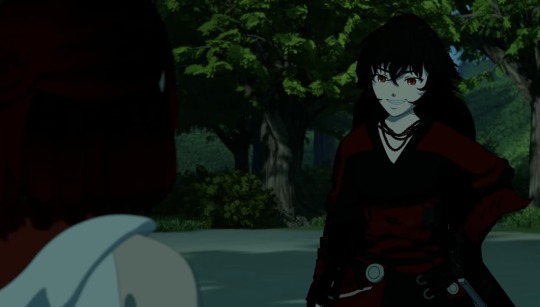
Goofy ass grin <3
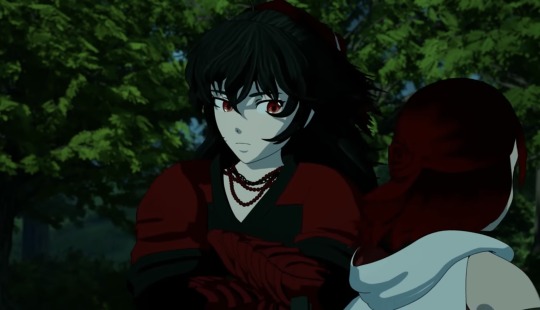
Summer: “Trust me..”
To this-
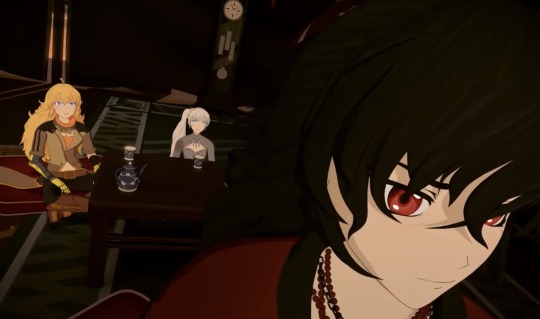
Raven: “The creatures of Grimm have a master named Salem. She can’t be stopped, she can’t be reasoned with, and she will not rest until humanity crumbles at her feet.”
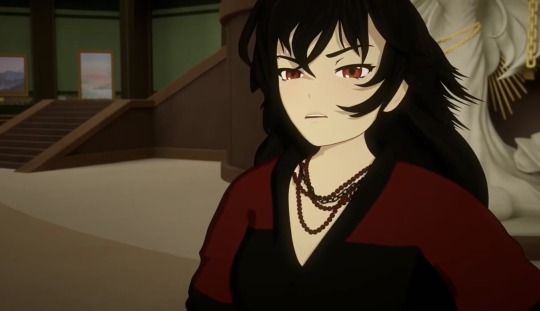
Raven: To Ruby with disdain, “You sound just like your mother.”
Let me lay some of my cards on the table. I’m in the “Summer is still alive” camp and I got thoughts on: if Summer is still alive, why has she not been in Yang and Ruby’s life?
Not even a peep? For 14 years?
Something BIG had to have happened to her to keep her away from them.
Now, a lot of folks will go straight to where Ruby jumped to: Summer got Grimm hound-ed by Salem
But I think that’s takes a lot of agency away from Summer and the building revelation of her character and the purpose she serves in the narrative.
If Summer has been grimmified, I posit it was by her own doing, by choice. And her choice alone.
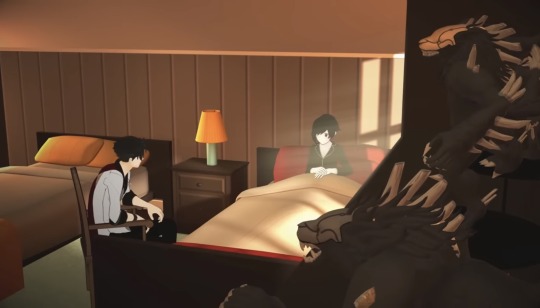
Qrow: “You’re special the same way your mom was…The creatures of Grimm were afraid of those silver eyed warriors.”
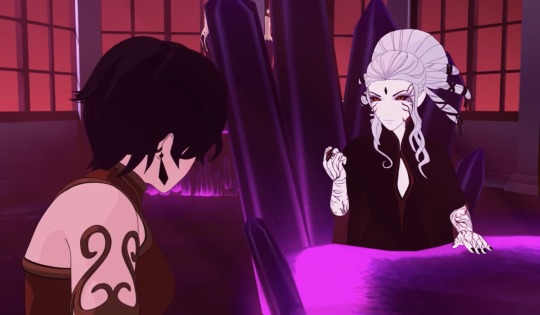
Salem: “Do you feel it? Don’t fight it girl. It can sense your trepidation. You must make it dread you.”
How does Salem illustrate the melding of Cinders flesh with the Grimm arm and mastery over it?
In the few instances we get, how are silver eyes described in their effect on Grimm? Obliteration, yes. Resistance to their influence? Possibly (see Ruby & the apathy). But command over them? Let’s explore that.
We are working with a pretty small dataset here, so you’ll forgive me for mostly drawing from Cinder for this (separate post I think the hound is a reanimated corpse and so different from true living hybrids like Cinder (& hypothetically Summer)).
Grimm evolve and Grimm hybrids, like Cinder, adapt.
From vol4 to vol8, Cinder’s Grimm arm grows. It spreads. And she becomes more comfortable with it as time progresses.
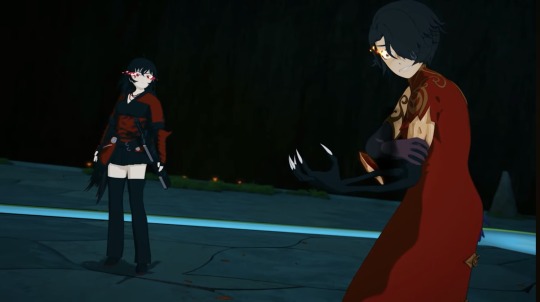
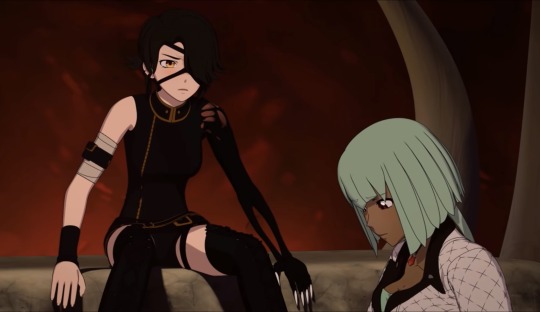
Cinders Grimm arm has become an integral part of her and, side note, I dislike theories that revolve her hypothetical redemption around her being purified of evil (Grimm) by silver eyes.
[But that’s just me, I want the monstrous to stay monstrous rather than erased or watered down for easy digestion. Let the monster stay a monster in its appearance and still be worthy of love, and so on and so forth.]
So, we come back to Summer Rose.
Summer confronted Salem, learned something earth shattering, destroyed Raven’s faith and trust in her, and did something that prevented her from returning to her daughters for more than a decade.
What did Summer do? Agency, we’re thinking strong choices here.
Choices that are radical but in line for a character with strong convictions, an alluded to pedestal she stands upon and all the complexes that comes with, perhaps a little self destructive, and a big heart. Big enough to sympathize with the devil and do something about it.
The thing that could be preventing Summer from returning home could be as simple as:
After she learned the truth about Oz’s shadow war, she joined Salem’s side, and won’t return until she’s seen it through to the end.
But I want to put some spice on there because what if:
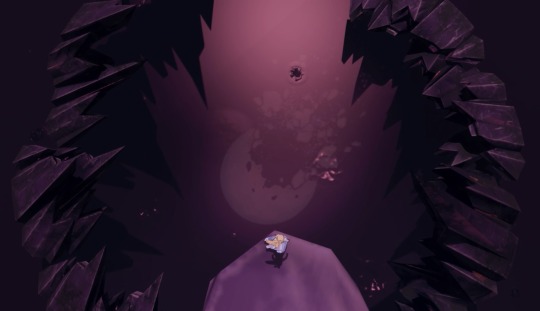
After learning whatever it was Salem told Summer, that turned her world upside down, Summer looked down into the pools of black and took the plunge
To understand Salem on a molecular level
To be Grimm as Salem is Grimm
To be a world changer
In the world of Remnant, that’s what the Grimm are. A force of destructive change, like hurricanes and wildfires, they shape the world through calamity. Disaster doesn’t feel any one way about you, it just is. It is devastating, but it doesn’t hate you. And it doesn’t love you either.
So, what would that make Summer?
How do you think that’s changed her, fundamentally?

Bloody evolution indeed.
And that’s why she stayed away. Summer changed, and now she looks a little more on the outside how she feels on the inside. But to the rest of the world, she is something horrifying. Unspeakable.
She didn’t want to give her girls nightmares.
Yeah, Summer was the inspiration for the Hound, and Cinder’s Grimm arm. But not in the way Ruby thinks.
#monster women#<<<33333#rwby#salem#summer rose#ruby rose#yang xiao long#raven branwen#cinder fall#the hound#I love the hound#rwby meta#rwby analysis#rwby v1#rwby v4#rwby v5#rwby v6#rwby v8#rwby v9#rwby volume 9#Grimm#creatures of grimm#silver eyes#saint’s ramblings
65 notes
·
View notes
Text
TEAM ASCENDED FORTRESS 2
An AU by me in which the mercs ascend to their ultimate forms
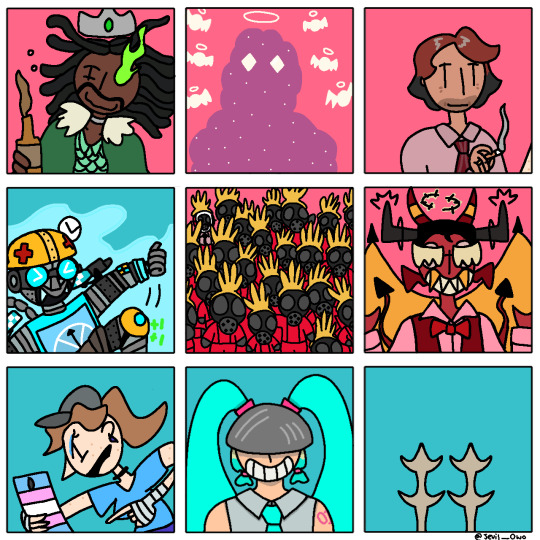
Oh God tumblr wrecked the quality-
More about the AU under the cut!
WOKE SCOUT: she started taking estrogen and instead of fixing her it made her worse. She gets into fights on twitter about neopronouns and has successfully cancelled everyone she doesn't like at least once. However, as cancel culture isn't real, this only lasted about three seconds for each. She managed to pull Ms Pauling also which is pretty cool.
SOLDIERSUNE MIKU: the ghost of Shakespearicles told him to dress as Miku and redo the salem witch trials. Only knowing one witch (Merasmus), he finished this quickly and now roams the country with Zhanna (who is now Zhannagane Miku after Mikus metal counterpart) spreading malice and wonder through the power of AMERICAN SONG COVERS. He uses a wig for the Miku effect, but is working on growing his hair out also.
MITOSIS: Pyro and Engie were shagging one time and they came so hard they did mitosis. Now theres 23 babey Pyros (count em) and Engineer is a single dad. There's a lot of Pyro Mitosis Lore™ in my head, but the basics are that they evolve into either humanoid, beastial, demonic or celestial Pyros eventually.
TAVISH, KING OF THE LOCH NESS: he did it he blew up that bloody sea monster and now he is king of Loch Ness. The self loathing has died down a lot which is great for him but his body is still a scrumpty distillery which is eh. Still, he has funky water powers and his partners Soldiersune and Zhannagane come to visit often.
KEEPER OF TIME AND SPACE GUY: Heavy was mad, he knew he'd been had so he shot at the sun with a gun. Instead of being a show off like that bitch Juno, he had a nice philosophical conversation and chess match with Time and impressed Time so much he was appointed as the guardian of Time and Time's partner, Space. His guns (the six angel thingies pictured) can turn into celestial weapons which helps in the protecting but people don't shoot at the sun so often so its a relaxing enough gig really.
GODDAMMIT ENGIE: after realising how much more efficient Gunslinger was than a lame ass human hand, Engie succumbed to his hubris and eventually replaced all his body parts with robot parts. Including his dick which led to the Mitosis Incident. Anyway. His chest is a dispenser which makes projects pretty convenient and he has a mini-sentry attached to each arm and leg, making him a walking weapon. This did not help with the god complex, but it helps with the single father thing.
THE INFERNAL DOCTOR: Medic kept attaching more souls to his own and selling them to Satan for power. Satan got so sick of this eventually he attempted to beat the shit out of Medic. By now Medic was slightly more powerful than Satan so this ended with Medic absorbing Satan's powers and basically taking his place. Somehow, his relationship with the guy who is now a celestial being was unaffected by this. If they really tried they could probably ascend even further. To godhood, perhaps. In any case, Medic becoming The Devil from The Bible did nothing for the god complex.
???: Sniper just kind of fucked off into the woods one day god knows what happened to him but Scout's convinced she saw him for like three seconds a week ago and "YOU GUYS HE HAD ANTLERS I SWEAR-"
RETIRED AND BECAME A FUNCTIONING MEMBER OF SOCIETY SPY: yeah. He's very happy with Scout's Mother (Maureen), and he's letting his roots grow out (his spy agency made him dye his hair black). He's even making an effort to be a good parent to Scout, bought her the trans flag ipad cover and everything, but she just keeps trying to cancel him. Maureen's sure they'll work it out between themselves eventually, but until then she has to keep finding more secure hiding places for the ipad (the best so far was the time she buried it under a tree a mile away, took Scout at least four hours to find and retrieve it that time)
There's also YURI MS PAULING, in which she pulled a whole polycule of beautiful women, but I'll cover her in another post.
Also TERFS DNI please. Woke Scout is just Scout being Scout (which is to say a bit stupid), and assuming all trans women are like that would be ridiculous. So fuck off.
#if you denizens of the internet think this is cool and interesting do tell me ive grown attached to this au since i invented it last night#tf2#team fortress 2#tf2 au#team fortress 2 au#tf2 scout#tf2 soldier#tf2 pyro#tf2 demoman#tf2 engineer#tf2 heavy#tf2 medic#tf2 sniper#tf2 spy#tf2 scouts ma#tf2 zhanna#tf2 ms pauling#boots n bombs n brawn#heavymedic#red oktoberfest#texas toast#team ascended fortress 2#trans fortress 2#the ones who arent scout are trans the other way#except Pyro who is a Species
83 notes
·
View notes
Text
SEDGEWICK SABLE & MITZI MAY : an overall study, part one .
discussing their individual characters, their relationship, their respective scenes, and a plethora of details found in-between.

this question is a good one! though i’m going to prematurely apologize for the length of my response to it, since this requires some extensive analysis. mostly because i feel like fans are prone to misreading and misinterpreting mitzi’s and wick’s relationship a lot in general, but also due to the fact there’s a lot of outside elements that are currently affecting their relationship as we see it in the comic. so to even begin to understand their mindset on the date, we have to rehash previous events and actually understand what’s happening within those moments. after all, like most good character writing, there’s a lot being said without actively telling the reader every little thing! it’s also important to note that this romantic relationship is very complex, with both parties involved being extremely human in nature ; prone to messing up and feeding impulses that, while understandable, aren’t exactly wise or good natured. for example, you will see some rather heavy miscommunication in this dynamic! but to start off with this beast of an analysis, let me discuss some statements i’ve seen made in regards to wick and mitzi, which are not only extremely biased in wick’s favor, but are factually untrue. these topics will come into play later! and will help establish some key elements i’ll mention again when recounting the events of the comic.
some opinions i’ve seen thrown around that are treated as canonical fact are a combination of ‘mitzi’s been setting out to use wick from the start / she isn’t actually interested in him / is merciless when taking advantage of him, and etc etc.’ -- and in order to properly begin this analysis and what’s really going on, you have to cast these ideas aside! i, personally, don’t think any of these views are true and serve as an extremely simplistic explanation for mitzi’s behavior, while also robbing wick of any actual agency he may have. he is not some helpless victim led astray by mitzi’s tempting offers and curves, and has even been stated to not be as morally righteous as he claims by tracy on occasion. he, like mitzi and everyone else in lackadaisy, is a heavily flawed individual! and that’s important to keep in mind as i go through and a.) debunk these misconceptions and b.) actually discuss the events of the comic, including the in-between we weren’t privy to as readers. i also don’t think i need to clarify this, but just in case someone out there is thinking it in passing : i cannot make it clear enough that mitzi is just as flawed as wick, if not more so! she is not an innocent party in the events, and i won’t shy away from discussing the morally ambiguous things she does either. however, it’s undeniable that she gets more hate than wick, or any other man in lackadaisy, thus i find it prominent to disprove the cartoonishly villainous reads of her character. i might defend her more than wick here, or approach her with more sympathy, but this doesn’t ever negate her wrongs and i know this. but with all these disclaimers, preamble, and topic starters out of the way, i’m going to go through these points one by one ( alongside their scenes together ) and discuss them as i see fit.
the first time we see mitzi and wick together is in the comic page introduction three : where they’re photographed together with some other noticeable faces, with a date of ‘5-21-1927’ dated in the corner. the two are beside one another and are leaning into each other’s space, an action that seems commonplace for them given how they’re depicted in the phantom bootlegger as well. it’s also worth noting that despite the rather tragic circumstances surrounding them, the two still appear to be in high spirits -- both donning a smile while flashing an almost coy look at the camera. they look as though nothing is amiss about the situation at all, honestly, and given their proximity, it appears they’re close. i’ve offhandedly mentioned to others that i wouldn’t be surprised if wick were standing in atlas’s ‘spot’, so to speak ; since he’s always shown standing to her left. it gives couple vibes! something that’s rather unremarkable since we know from wick’s own mouth that he’s been interested in mitzi since her days as atlas’s wife, as well as the implied affection at first sight in the side comic limestone. but i’ll note it nonetheless, because if this photo was taken before the proceeding events ( a likely story, since freckle is absent in the photo ), then this implies a closeness between wick and mitzi. they are comfortable around each other and are rather pleased to be in each other’s presence well before acting upon any feelings in a romantic light, unabashedly friendly before the other lackadaisy crew as well as not minding being posed so closely while being photographed together. they are on good terms and have likely stayed that way since they’ve known one another -- i feel like people act as though wick and mitzi had no genuine bond prior to the events of the comic, when it seems rather implied they were at least friends before. this also very weakly discredits claims of planned manipulation from the start as well as mitzi not liking wick outside of his money. the only thing up for debate, in my eyes, is how close they were, not if they were close at all … though now we reach actual canon events, most notably pages such as : formaldehyde, overtime, hallelujah, overture, caveat, and rendezvous respectively. these are pages that i’ll be talking about in length, since i see them as necessary reading ( and rereading ) for these two before volume two’s events.
formaldehyde, overtime, and overture are sort of bundled together for what they reveal where it concerns mitzi’s plans with wick as a person in her life. i think it’s easy to view her joy upon seeing sedgewick in the paper as an opportunistic lightbulb ; ‘good news’ that she can exploit and a balm applied to her financial troubles that had her looking at the obituaries for some levity. but i’d argue she is genuinely happy for wick too, with both selfless and selfish intent. while actually celebrating his success isn’t her main concern, i see some part of her proud of him nonetheless -- even if it’s an unspoken congratulations. though what’s more pressing is that it’s here that we see her intentions as clear as day, which is that she plans to schmooze wick’s investor friends in order to keep the lackadaisy afloat. emphasis on the investors here! her letter to wick shows her priorities clear as day, sending extra club pins and drawing attention to the desire for extra company, and not just wick’s own. when wick swindles the rather bored crowd the lackadaisy’s way, we see how mitzi leaps into action ; giving the men her full attention and chatting them up, making her motives clear as day to them while maintaining some business coyness. the real apple of her eye here is edmund church, who is poised to appear as the leading man where the investors are concerned, and even her body language is attentive towards the man. facing him directly, leaning the full weight of her body towards him …

but while doing so, she is visually turning herself away from wick. back practically turned to him and his presence all but ignored. it’s clear he’s not her schmoozing target, which implies she’s not searching for an investment from wick himself ; as though this is a line she doesn’t wish to cross, and would rather find her money elsewhere despite her mounting desperation. we also know that before these events that mitzi has sold everything she could in order to make things work, including rather sentimental items like wedding china and not limited to whatever mansion her and atlas previously lived in. to me, this shows that mitzi was never planning to use wick at all, really, and in fact was so against the notion that she’d rather manipulate his friends than the very easy target beside her. while she’s arguably a selfish character, people seem to not grasp how hard she tried to keep wick from becoming more than a loyal patron to the lackadaisy. it’s only when all other avenues have been exhausted that she attempts to use him -- and we’ll talk in depth about this decision later, since it wasn’t an easy choice, much less something she decided to do without some inner turmoil in her heart. and while yes, her exploiting wick’s investors is her using him to a degree, it’s worth noting that ( and i cannot stress this enough ) wick was more than well aware of her intentions and brought the men along anyway. he feeds these men to this lady he fancies, something church will call him out for in caveat and something borderline confirmed in overture itself. wick is hardly the idiot people make him out to be! he may be prone to obliviousness, but he’s no toddler who fails to understand even the most obvious social cues. at this point in the comic he trusts mitzi completely ; unfazed by the rumors she killed atlas and believing her incapable of violence due to how long he’s known her. he thinks her kind, he thinks her graceful, and his fondness for the widow is palpable in most of their early scenes … and even somewhat during the time in which their bond is strained.
in fact, the first time mitzi acknowledges wick’s presence beside her is when wick pipes up to offer her advice on how to win church over. not only is he aware of what she’s doing, he is now actively encouraging it by offering up tips and tidbits he probably learned himself when securing church’s investment, all while he smiles and leans towards her, a flirtatious and admiring nature about him.

sedgewick sable may be one of the kindest men in lackadaisy, but he’s still a capitalist at his core, someone who knows how important money is and is used to the give and take society he’s a part of. and while he’s still helping mitzi here, there’s also little denying the fact that he’s doing this to garner brownie points with her … there is some self interest he’s serving here, even if he’s rather sweet about it. as church so eloquently puts it, wick essentially tried to “charge in with ( his ) group of shareholders in a great display of concern for the lady.” and while wick vaguely denies this claim, i think it’s more than obvious that’s exactly what he tried to do here, especially given how quickly he admits it’s “difficult to resist a damsel in distress,” while adorning a rather sly look. what happened here is wick was bluntly called out for his readiness to use the investors so he could get in good with mitzi, appease her and impress her in some way, and he seems rather shameless about this intent thus far. many fans misinterpret this scene, due to being fiercely protective of wick and quick to sense church’s antagonistic role. and just to be clear, when i say antagonistic, i mean that he is the voice of opposition against something that wick’s arc is all about ( i.e. being in a relationship with mitzi ). because of this, fans are inclined to dismiss everything that church says as patently untrue. however, i find it pertinent to reassess church’s specific wording. when he speaks to mitzi in overture, he calls her business ‘criminal reputations’, and though mitzi is able to win him over enough that he stops complaining, he goes right back to his original opinion come caveat, where he states that ‘there’s no reason any of us should have an interest in illegitimate business’. what church says next, however, is curious ; he brings up both mitzi’s reputation and wick’s, pointing out just how incongruous they are, and spells out for him that if he’d like to associate with criminals, then he is in the wrong career. at no point does church tell wick not to have feelings for mitzi nor to pursue them -- what i believe church is essentially reminding wick of is that people will notice his associations with the lackadaisy if he decides to mix business and pleasure like he did tonight. after all, what wick has done, in the simplest of terms, is try to goad his investors into making an objectively harmful business decision so that he could get in good with a woman he fancies. the problem is hardly that wick goes to the lackadaisy ( after all, church and the other investors do go to speakeasies! ), or even that he has a clear interest in mitzi may. rather, church is warning wick against letting his personal feelings guide him into making poor decisions in his business.
it’s not shown how wick reacts to church’s advice, but seems to initially dismiss it, as he spends the rest of his time ushering them away and paying for viktor’s medical bills, an action he does partly due to wanting to look good in front of mitzi once again. while i believe wick would’ve paid them anyway ( he couldn’t ever just let viktor die ) i still find it interesting how the comic highlights ivy using mitzi against him and this working effortlessly. he stops asking questions and stops debating about the ethics of taking viktor to the hospital and merely pays the doctor when quackenbush gets there … before scrambling off to make himself useful at the little daisy.
all of this is to say that wick is hardly some helpless victim who was being used against his will here. he had something to gain from this too and helped these events unfold, completely aware of mitzi’s desire to win over his investors for her own needs. wick’s knowledge of this will come back into play soon enough, although we’re going to talk about mitzi real quick, as well as the comic page rendezvous.
after the events of killjoy, mitzi’s already dire situation takes a turn for the worse due to unseen circumstances, with many things falling at her feet at once. the last vestiges of their reputation has been tarnished alongside what was a golden opportunity, the lackadaisy is trashed and destroyed, she finds out that mordecai has taken all their arsenal, viktor is shot to hell, and had it not been for the presence of a stranger, the likelihood of her, rocky, and zib kicking the bucket was too likely to be comfortable. naturally, mitzi seems composed during these stressful events, keeping her cool as best she can and acting unfazed by what was imminent danger ; to a degree, this show of apathy is genuine, in the sense that mitzi is unafraid of death and physical harm. she made the choice to stay in the lackadaisy despite knowing she’d be safer on the other side of those doors, and in loggerhead she even implies she’d rather take the risks and die because allowing the lackadaisy to fade out of existence is a ‘sadder fate’ in her eyes. i don’t think i need to talk in length about how unhealthy this mindset is or how much this demonstrates mitzi’s obsession -- her selfishness to cling onto her husband’s ruinous legacy is so severe that she would even be happier perishing in its place, an almost passive suicidality mindset that i don’t see touched upon often. but for all her nonchalance about shootouts, there’s this worsening tiredness and despair that clings to her eyes and gestures when the pig farmers are slain. forced to do nothing else but accept the grim reality of such a brutal aftermath and see viktor’s awful state for herself, another blow she gets to see up close. they could’ve lost everything here, and they almost did! it’s a devastating end to a once hopeful evening, one that has her aimless and with no real plans for a future. i don’t think mitzi even thought to use wick even upon hearing about his offered charity, yet i believe we see the exact moment when such a thought crosses her mind ; maybe not for the first time, but here is when the idea becomes too tantalizing to ignore. she’s out of options and wick is there, like always, and mitzi’s desperation ( her grief ) eclipses any care she has for wick in a singular moment that changes their dynamic completely.
we’re finally at rendezvous, which is probably the most important page ( or at least one of the most integral pages ) to wick and mitzi’s relationship. a lot happens here between these two characters despite the simplicity of their actions, after all, chatting for a little and then kissing isn’t much to sneeze at plot wise. but what’s pressing here is the visuals and the dialogue rather than their actions. we start off with mitzi entering the little daisy cafe and catching wick tidying up the mess rocky and freckle created when they ran through the building ; he’s obviously waiting around to hear of viktor’s condition and doing something useful with his hands in the meantime, having been interrupted from where he’d been staring at atlas’ picture on the wall. miss may makes light of his ‘raiding’ and says she could’ve just made him something to eat if he really wants and wick responds in kind, sarcasm and banter exchanged briefly before they touch upon the events unfolding around them. mitzi expresses her gratitude and ensures she’ll pay wick back ( something she says without being prompted to ) before telling a curious wick about viktor’s condition. unable to help himself further, he asks mitzi what happened tonight, to which she remains silent -- wick realizes he’s better off not knowing and relents with a smile, to which we get this line from mitzi.

there’s a properness to this, where she goes as far as to stop using his nickname to address him as sedgewick instead. her paw reaches up to begin fiddling with her necklace ( something she does whenever thinking or reminded of atlas ) and before she can finish her thought, her attention is forced from wick onto the very picture he’d been staring at previously. my opinion on this scene is that, for all intents and purposes, this reads like some sort of formal rejection ; flavoring in ‘you’re so kind’s and ‘such a swell man, you are!’s before ending with your resounding no, so to speak. i think in this moment, mitzi was going to be honest with wick instinctively, especially after he saved her some trouble despite not having to. ”and i would hate to …” use him? lead him on? seemingly promise something she’s incapable of delivering upon? maybe she suspects he paid for viktor’s bills to win her over ( a semi correct assumption ) and wants to clear the air on that. say that while she’s thankful and while wick is an amazing person, he won’t be ‘getting’ anything out of this from her … not right now. i’ll talk more about how i believe mitzi views wick in a moment, but all in all i struggle to see what else she would’ve been trying to say here if not some kind of soft rejection. values his loyalty and kindness too much to lead him on in that way, or take advantage of him -- until she isn’t, which just happens to be obvious in this next scene. i need it on record that visually this is one of the most compelling scenes in all of lackadaisy to me! there is something so disturbing about it, somber, an eerie feeling that something is amiss and that mitzi’s state of mind is undeniably poor. that her view of things is clouded and warped, and this will overshadow any of her true thoughts or feelings due to this skewing of priorities.

and here we have this brief moment, a single panel of silence that doesn’t last more than a second perhaps, before mitzi ultimately kisses wick. what we see visually is wide, doll eyes staring at atlas -- her husband framed in time and sat at the little daisy cafe, surrounded by men who admired and feared him in equal measure, successful, and ‘looking’ down at her. seeing him renders her speechless, only roused from this heavy stare down when wick replaces atlas with his own face ; confused and worried, not at all similar to the emotionless expression she was taken by, but it’s interesting nonetheless. it’s only then that mitzi pushes into wick and kisses him! and i think this very scene is when mitzi not only thought to use wick, but was far gone enough to actually do so as well. there’s a lot of things to be potentially dissected from this scene! mitzi’s obsession with atlas, how she’s far gone enough to ruin a friendship just for his sake ( and for her own as well ) … or the fact wick seems to be her new direction, shallowly filling what space atlas has left behind, perhaps easing her loneliness and money woes all the while. this scene is never discussed and it’s criminal it isn’t, when there’s so much being said here in the silence of it all. she is haunted and tormented and all she can see is atlas, and after everything that’s happened to her and the lackadaisy, wick becomes an avenue and a tool for the sake of it. it’s not a kiss she seems to even enjoy and it looks as though it’s entirely impulsive and forced on her end.

with comics, it’s finicky to decipher what happens between panels, but what’s obvious here is that wick doesn’t respond to her advance immediately, which causes mitzi to pull back. she apologizes vaguely, giving a dismissive ‘i do that sometimes,’ something that’s probably not even true given how valiantly mitzi loathes feeling like a ‘harlot’, so to speak. she’s obviously trying to brush this incident aside ; either having come to her senses and being rightfully embarrassed or taking his unresponsive nature as her having read him wrong. feigns aloofness when wick asks what she does so often exactly, still distant by all means, and had it not been for the olives and their forced proximity, she might’ve made her leave. as quickly as the impulse came, it had left, and i don’t think it’s out of the realm of possibility to think mitzi quickly regretted her actions here due to how emotionally driven they were. but instead she lingers and stays, and then ( in my eyes, given the composition of the pose ) wick yanks her into another kiss now that the surprise has worn off. after all, he did want this! she had caught him off guard is all. it’s worth noting she looks more at ease with this kiss, knowing it’s reciprocated and enjoying it as a passionate thing led by wick rather than herself. maybe she can excuse it now, her attempt to use him, since he’s ‘leading’ so to speak. regardless, this is where rendezvous ends … however, i want to address one more thing before i move on completely.
there’s no true way of telling what happened after this comic page due to the morning timeskip we experience. all we know is that wick eventually went home, after being out ‘later than usual’, which could imply he stayed for a lengthy period of time after or could simply be referring to the fact he didn’t leave with bix at first. i’d argue the earlier assumption based on the fact wick technically ‘left early’ anyway due to the raid, but that’s besides the point. people seem to believe that mitzi selfishly dropped this investment deal onto wick, that it was solely her idea, yet we see multiple times in volume two that this isn’t the case at all -- and that wick not only agreed to meet with her, but seemingly for the purpose of talking about his potential investment. here we have wick acknowledging he made last minute plans in grindstone, as well as mitzi heavily implying wick was very much into the idea of investing in her business last night in doublet :

wick never refutes these claims and the narrative does nothing to disprove this either. so it’s safe to assume that either during their necking or thereafter, one of them brought up the idea of wick investing and they both seemed eager about the prospect, enough so to agree upon meeting later in order to discuss the actual details. once again, wick is well aware of mitzi’s intention during the events of her date, an intention she barely bothers hiding because they’ve agreed to talk about it, and we’ll put a pin in that for later. now that we’ve actually concluded the canon events leading up to volume two ( as well as some moments in between ) i’ll briefly talk about mitzi’s and wick’s feelings during this time.
one of the biggest problems they’re facing currently, and one that will worsen over time, is that neither of them are on the same wavelength here. there is undoubtedly mutual attraction between them as well as affection, but how they view and understand these emotions is where they stay divided. we have sedgewick sable who’s well aware of his feelings ( or, in time, thought he was anyway ), has been since meeting mitzi for the first time, and is so bold in his fondness that he lingered inside her circle despite her marital status. he knows he wants mitzi romantically or at the very least casually … everyone around him can tell this too. it’s not some secret or taboo sin wick is prone to shying away from! he doesn’t even care about the rumors or her widow status -- or how bad it would look to be public with her given the mysterious and illegal circumstances she’s surrounded in. he desires to impress and woo her on top of being helplessly smitten.
where they seem to differ is that while wick is keenly aware of his attraction, mitzi is not. or, more accurately, has no clarity to which she can view it and understand it for what it is. during the events of the comic, she’s long since rewritten her memories of atlas and has painted them in this golden picture of pure happiness and true love and joy … she’s romanticized her past with him, purposefully forgetting things in order to maintain this ‘i had a fairytale life when i was married to atlas’ viewpoint. we see how this perspective affects even the most major of things, like the way mitzi casually spits in the face of her old life with the band, now adamant about the fact she was miserable then and felt just oh so disgusting while performing. while i believe some of those feelings are true, i also believe that mitzi is inherently devaluing things that aren’t related to atlas due to a mixture of obsession and grief she’s not looking in the eye. when you lose someone you love or loved, the sudden hit of loss makes it very easy to morph the person in your mind into someone perfect and godly. mordecai has likely done the same thing. it’s simple to deal with heartbreak in that way, to better love someone when they’re dead and gone with only memories and photos and feelings left behind as evidence they were ever there at all. in many ways, mitzi can’t comprehend atlas anymore, and has channeled her wounds into this constant conflicting fixation instead of something to heal. so, naturally, she is not thinking about herself -- her desires, her wants, her thoughts, or her feelings ; it's a chorus of atlas and the lackadaisy instead. mitzi isn’t in the space of mind to inspect her feelings towards wick and figure out whether she likes him or not … not when all she cares about is her priority. it also doesn’t help that zib, the person who arguably knew her best ( but doesn’t know her anymore despite how they both pretend otherwise ), immediately accuses her of using wick at the very beginning of volume one.

again, zib isn’t wrong and it turns out his fears are more than valid! but it’s worth saying that mitzi’s clouded mind is already having the notion of ‘you don’t care for wick like that, you’re just using him’ shoved into her brain as evident fact from someone who’s important to her. while she fancies him and would, in another world, be more than eager to engage in frivolous courting and romantic inclinations, i don’t think she herself knows that. but if she did take a moment and examine what she’s doing and how she feels now, she’d probably dismiss all that and be more than convinced that she’s manipulating wick, utilizing his attraction to her while having none of her own in order to steal some much needed money from his pockets. like i mentioned in this post, mitzi likely believes atlas was her one true love and that she’d never love again, furthering this notion of her accidentally puppeting her own emotions to be more understandable in her eyes. this ( coupled with guilt for using wick so brutally ) is also why she appears to almost avoid romance entirely during their ‘date,’ only ever resorting to such overt flirtation when desperately trying to get wick to talk to her about what she needs to talk to him about. her methods and actions during those events are more calculated, as was her initial kiss in rendezvous. it’s also worth noting the next time we see mitzi is while she’s getting ready, sat at her vanity and looking particularly small and numb. it’s giving some levels of dissociation! this is not the expression of someone who’s remembering the events of last night fondly, which sadly includes the kiss between her and wick.

but still, we as the audience know she likes him subconsciously. we cannot always trust her perspective and instead need to analyze and look at the little things to infer if her views and genuine feelings align. her constant fondness for wick shows itself even during moments where mitzi believes she is uncaring. she is usually smiling at the mention of wick or from being around him, will casually touch him affectionately, and is visibly enjoying the act of posing with him in photomajig. everything i’ve previously said more than proves she cares for him to a rather utmost degree too. like most of their relationship and respective characters, these two extremes can coexist in their own unique way, and i wholeheartedly believe they do. i’ll also acknowledge that i haven’t talked about wick much, but don’t worry! we will get there in volume two soon enough, which i will now be covering and analyzing in detail as well.
as mentioned previously, the next time we see mitzi is after the events of last night, likely sometime in the afternoon given later events. she is putting in her earrings while sat at her vanity, surrounded by a seemingly endless supply of photos ( another metaphor for the past and how it never really leaves her alone ) as she looks on with an apathetic sort of misery. she gets up and totes around a tommy gun which she then shows off to the portrait of atlas in her ( still his ) office ; giving him a rather generous debriefing that leaves out some integral details, like viktor being shot, before harping more on mordecai and how she needs to deal with him so things won’t get worse. the only mention of wick here is her telling atlas that it ‘wasn’t a total loss,’ though her rather kicked expression, as well as how quickly she brushes past the details of that, implies she isn’t satisfied with the state of things. i also find it interesting how little she admits to the deterioration of things here, before the portrait of her dead husband, because while this can be seen as tracy not wanting to recount all the events we’ve just seen, i think there’s a level of avoidance here too. mitzi isn’t keen on vocally admitting to how bad things are, how much was lost last night -- perhaps due to the fact she’ll be forced to confront the actual helplessness of her situation, and realize that things aren’t exactly fixable as it stands. there’s actually very few instances where she willingly shares her feelings or talks about the state of the lackadaisy to anyone, and the few times she actually does so, it’s either a.) a weapon to utilize against someone else, like some kind of guilt trip, or b.) it bursts out of her like a dam. she is extremely private and reserved where it concerns her emotions, always wishing to appear competent and above things, and in my opinion, it’s something worth noting. after this, she decides to call the maribel hotel and confront asa about his and mordecai’s involvement in last night’s tragedy.
the phone call itself plays out, in the most simplistic of terms, with mitzi’s desire to discuss things being disregarded as asa avoids her through various means. he questions why she’s bothering with such low quality hooch, and upon mitzi trying to bring the conversation back to the original topic ( aka why asa would do this ), he then pries about the lackadaisy’s desolate state before telling her to quit before things worsen. mitzi expresses confusion, but once again isn’t able to form an entire sentence due to asa abruptly ending the call after deciding for her that they’ll just discuss this over lunch. all in all, it’s an extremely rude and frustrating exchange. and sadly this won’t be the only time today where mitzi tries to talk to someone about a rather pressing topic, one very important to her and the wellbeing of her establishment, only to be dismissed at almost every turn until the very end of things.
in the next page, mitzi is depicted silently stewing in a chair much too big for her, glaring daggers at nothing in particular, more than angry at her failure of a phone call. she is unresponsive to rocky’s rambling, including the potential hiring of freckle, and only rouses herself out of her irritation when realizing she can bring the two boys along in some sort of display of power. it’s a rather weak and grasping attempt at maintaining some level of control, especially when she outright tells asa why rocky and freckle are there : “you see, my circumstance isn’t quite as hopeless as you -- ” it’s a very obvious posturing, a weak show with nothing really backing it. neither asa or mordecai are impressed or swayed by this at all, with mordecai even calling out that rocky is some band member rather than some gun for hire. his insults rub salt into mitzi’s wounds ( which is why she believes asa brought mordecai at all ) and only then does she discuss viktor’s awful state, a hasty guilt trip that quickly loses its shine the longer she drags it along. while i may view mitzi through a more sympathetic lens than most and hardly believe her major flaw to be manipulation, she is still capable of it and will stoop so low when it may benefit her, or perhaps whenever it makes her feel a bit better. and this brief interaction with mordecai is one such case.
the overall contents of the lunch and the car scene thereafter proves rather irrelevant to my topic, so instead of summarizing how it goes ( poorly, it goes poorly! ) i’ll be talking about certain events that will matter later, or will help us understand where mitzi is at mentally by the time she actually meets wick for their planned visit. the major components being how asa treats mitzi during this impromptu meeting and the state mordecai leaves her in after they discuss atlas.
to touch upon asa’s treatment of mitzi, even from as early as the phone call we see that mitzi is forced to have a conversation with asa on his terms rather than her own terms. mitzi sets out with a clear goal in mind -- learning why asa sweet would attack the lackadaisy in the way that he did -- and she's repeatedly talked over and threatened, with her questions remaining unanswered. it’s very clear very quickly that asa doesn’t respect mitzi nor view her as someone worthy of his time like atlas was, and almost appears to approach her in a misogynistic manner. he demeans something as simple as her ukulele as a ‘teeny little guitar’ and acts as though mitzi’s tears would be bothersome to him, some sort of burden he’d be forced to deal with rather than a valid emotional response to threats, degradation, and the likes. while asa is by no means wrong with some of his observations, he’s certainly rude and uncaring with how he goes about it. when he tells mitzi that he’s here to suggest that she step down, because he so generously has her interests in mind, she doesn’t buy it ; once again bringing up last nights events, where asa willingly armed the pig farmers with the lackadaisy’s arsenal and sent them over her way without so much as a warning. asa dismisses this coldly, once again dodging any fault and claiming it was ‘happenstance’ and entirely mitzi’s own doing. even now, when he’s actively threatening her and making it clear they won’t stay friendly if she keeps trying to make it in this business, he still won’t fully admit to any sort of responsibility for the disastrous night he helped put her through. while this seems rather typical of asa given his disrespectful streak ( something even mordecai, as valued and as useful as he is, suffers because of ) it’s worth noting that this side of him is new to mitzi and not one she was at all expecting. she even says as much here, in heartstrings :

we also know that mitzi only met atlas due to her performing at the marigold speakeasy first, and it’s likely asa was rather present in her life due to his bond with her now husband. asa even admits that mitzi may be confused because they’ve ’managed a friendly coexistence for so long,’ once again hammering home this idea that up until this point, asa was indeed kind to mitzi, or at the very least cordial. but with atlas out of the picture and mitzi trying to take his position, suddenly asa is more than okay with getting her killed or taking all she has left -- even his plan is nothing short of apathetic and cold, an afterthought, expecting her to give up something important to her and only offering a one time offer to play at the marigold room ‘sometime’ with that ‘old band of hers.’ i’ve actually seen some people claim this was a valid out for mitzi to take, which i can’t disagree more with, since a.) her band days are not something mitzi is interested in anymore and b.) she’s sold basically everything to keep the lackadaisy afloat, meaning she’d be more than poor if she gave that up. playing once or maybe twice at the marigold room wouldn’t save her financially! it wouldn’t do anything for her at all, besides giving mitzi some sort of last hurrah in her mata hari dress, something that doesn’t even fit her anymore. while it’s clear to anyone that she needs to let go of the past in order to be happy, accepting this poor excuse of a deal from asa is just her trading one past in for another one. this is also why zib’s out, while certainly better, isn’t something good for mitzi either. but that’s another post on its own, so i’ll leave it alone for the time being. what’s important here is that mitzi is ruthlessly betrayed by a man who used to like her and is treated as a lesser thing due to his view that she’s too incompetent to run a rumrunning business. he also brings up atlas to, in mitzi’s eyes, ‘intimidate ( her ) into agreeing with him,’ and towards the end of the lunch, she looks particularly kicked and undoubtedly hurt. she leaves this meeting that could’ve stayed a phone call with a potential enemy made and with the world on her shoulders, now more determined than ever to be someone people like asa would be forced to respect. instead of being dissuaded, she’s been encouraged, and it’s not hard to realize why.
her scene with mordecai leaves her in a similar predicament after their very brief truce is broken, with him perpetuating asa’s threats as well as saying, “as though you could bring the remains of atlas’ estate to anything but further disgrace,” before promptly leaving. these words, plus the subject matter and who said them, leaves mitzi staring out the car window and actually brings her to literal tears. her eyes are suddenly watery, and when rocky tries to make her feel better, we see one paw hastily wipe at one eye in particular -- already having spilled a tear or two by the time her hires have made their way back into the car. i cannot stress enough that throughout the entirety of this brief arc, mitzi has been constantly ridiculed and told she is not good enough at this job to be doing it, on top of the extremely sensitive subject of her husband being brought up twice over, which only served as one more jab to be made at mitzi’s expense. she desperately wanted the lackadaisy to work before, some sort of memento to atlas that she could keep going, and being told to let go of it in such a harsh way isn’t going to have the intended outcome. most people become vindictive and determined when told something is ‘impossible’ or that they won’t ever be able to accomplish what they want because they’re too incompetent to do it, they see this as a challenge, they get angry, and they start fighting harder for the goal in question. it’s rather human : to be fueled by wounded pride and to want so badly to prove others wrong, to taste the victory of accomplishing something deemed impossible, to warrant the respect of your peers … mitzi is all that and then some, since she’s gripped by an obsessive grief that refuses to let her go.
she wants to do this for atlas, she needs to do it for atlas, and there is no life or goal outside of the one in front of her. again, as mentioned paragraphs before, she’s made it clear she’d rather die than see the lackadaisy wither away into nothing. asa’s and mordecai’s threats, their insults, were never going to do anything except push mitzi further down the path she’s already on. and with the added bonus of mitzi now being in an extremely fragile emotional state ( one she hasn’t had a single break from since last night ), this then causes her decision making skills to be finicky ; more likely to make rash calls and to act desperately, rather than thinking clearly and with her head. mitzi does her best to sweep her fraying mental state under the rug for the sake of business, with the comic page haggersnash providing the visual of her reapplying her makeup near the traitorous eye and she even goes as far as to change her clothes, though there’s no denying the perpetual state of misery clinging to her character moving forward. and like we’ll see in wick later, mitzi probably also didn’t get much sleep last night herself. that paired with the nonstop events that refuse to work in her favor, and the occasional mental breakdown, is more than enough to reiterate for a final time that she is not well, despite how good she is at appearing so.
shutting the door on mitzi and her no good very bad day, we then shift back into wick in the second and final part of this essay.
#my posts.#lackadaisy analysis.#lackadaisy#mitzi may#sedgewick sable#character analysis#tracy j butler
48 notes
·
View notes
Text
Hollow
SPOILER WARNING FOR SCAVENGERS REIGN.
Many people have remarked on the parallels between Levi and Hollow. One is a human creation changed and given sentience by the planet, the other is a native of the planet altered by her experiences with a human. Both have a connection to Fiona: Levi because Fiona programmed them, Hollow because memories/visions of Fiona are the primary way she communicates with Kamen.
From the get-go, Levi is established as a character with agency. One of their first on-screen actions is to troll Azi by burying her wrench, and when Azi asks why, Levi replies, "I don't know. I was curious about how you'd react." Levi is bipedal and verbal, things we associate with humanity, so even setting aside their quirky behavior, we are already primed to see them as human-like, if kinda weird. Throughout the show Levi continues to perform autonomous actions, to be motivated by curiosity and wonder, and eventually to assert their own personhood, establish boundaries, and form a meaningful relationship with Azi. They have goals, they have motives, they have an arch. Before this, Levi was just a machine. They are uplifted by the planet.
Hollow, on the other hand, often comes across less as a character and more like a blank slate onto which the viewer is invited to project metaphors: metaphors about Kamen's psychological dysfunction/moral failings, metaphors about the corrupting influence of humans on the natural world, metaphors about avarice or addiction or any number of things, none of them good. Even the name (never spoken but present in subtitles) implies an empty vessel. In contrast to Levi, Hollow is non-verbal (she uses psychic projections to communicate, but has no voice of her own), small, and quadrupedal. We are primed to see her first and foremost as an animal: an innocent, living in (from our outsider human perspective, at least) harmony with nature. A little creepy, a little cute. But also a being lacking in any real self-awareness or moral agency. This, though, is presented as her ideal state. Her growing power and agency, throughout the narrative, is framed as a downgrade, as borrowed, inauthentic, and destructive...and is ultimately ripped away.
True, Hollow is given a bit of characterization when we first meet her. She is being bullied/intimidated by a larger member of her species, and she appears discouraged by this. But for the most part her motives and choices are either impenetrably alien or presented ambiguously. Maybe she decides to adopt Kamen as her thrall, despite his alien nature, because she feels frustrated and powerless and has decided to take a risk on something new...or perhaps even sees him as a kindred spirit, a fellow outcast. Or maybe she just happens across him and is reacting to her environment in the stimulus-response, amoral kind of way we associate with less complex animals.
All her choices after that feel similarly ambiguous. When Kamen first gives her fresh meat and she eats it, it feels like crossing a boundary. She's obviously an omnivore or she wouldn't be able to digest it, but this moment has an almost Original Sin type of vibe, Hollow the Adam of her planet and Kamen as her Eve offering the forbidden fruit...or is she just eating whatever her human puts in front of her, like a Golden Retriever? Does the blame lie with her "owner"?
From there it's a spiral. More and more meat, then experimenting with cannibalism, then becoming increasingly ruthless with her thrall as a means of pushing him to hunt larger prey. Is that her, or is that Kamen's greed and insecurity leaking into her? Is it both?
When Kamen remembers his wife's death and pleads with Hollow to take away the pain and she straight-up unbirths him and bids him sleep, is she doing this out of empathy for him, or is she (again) simply responding in a stimulus-response way to the alien emotions seeping into her? Her face gives few clues; a slight narrowing of the eyes, an implacable blankness.
And yet there are indications that her species has human or near-human intelligence. The ability to psychically manipulate a codependent thrall, to present him with narratives laden with emotional cues that push him to respond in certain ways, is a skill that feels ethically dubious by its nature and therefore linked with personhood. As humans, we are defined by our narratives, by our capacity to manipulate each other through them. She becomes the model of a person she has never met inside another person's head. Does it feel like writing a character?
And she does not merely pick and choose memories, she speaks through them. When Kamen is about to flee the safety of the cave and blunder out into a storm that will likely kill him, Hollow becomes Fiona and reminds him of the time he took the canoe out and nearly drowned. "Remember? You were so helpless," she says. Did Fiona ever speak those words to him? Is it like replaying a recording? Or is Hollow RPing her?
When Hollow found Fiona's corpse, what did she think? What did she feel?
In the end, Levi rips away Hollow's physical strength and power, reducing her to what she was before any of this happened. We are left to assume she will return to the forest, go back to her vegan diet and her pre-verbal ways: human notions of purity. The nobility of beasts.
But she looks back.
I don't think she's forgotten. I don't think Levi, the uplifted being who was so very afraid of losing the ways in which they had changed, would have made her forget.
60 notes
·
View notes
Note
Oh u ate!! Yeah the way the characters are treated is kinda .. headcanon heavy nowadays in the fandom. I absolutely understand why some people’s interpretations of the text can become very emotionally charged and personal and maybe even biased, but we can’t really pick and choose what we see. Ted is an unreliable narrator yeah but Ted quoting Ellen saying she doesn’t enjoy the sex isn’t him saying that they assault her, it’s Harlan showing what a gross, twisted situation it is that the sole woman of the group feels that she has to give herself to the others just to comfort them (the way a lot of women are often reduced into sex objects or maternal figures). You can argue that Harlan writing the only female character this way is sexist but it’s also just the reality of how a low of women are viewed. Ted can’t bear the idea that she’s doing it out of genuine good intentions in any way, or maybe that everyone else is suffering as much as he is, so he claims she must enjoy it. He is constantly shifting between putting her on a pedestal, above them, and then seeing her as dirty for servicing them in the first place.
Yes the circumstances are unnatural and abusive and in any other context, Ellen wouldn’t have done it. It’s up to interpretation if it was all her decision or if AM made her a nymphomaniac (I’ve seen people say this but I don’t remember it?), the point is that it is a bad situation, they’ve all been stripped of their agency and a lot of AM’s psychological tortures on Ted can be interpreted as parallels to sexual assault imo. (‘He touched me in every way I had ever been touched’, I really hate how people sexualise that line as if it’s shipping fuel it’s literally mind r*pe.)
Ellen does it because she’s meant to be the ‘kind selfless woman’ of the group. The main message of ihnmaims is kindness in humanity and I feel Ellen and Ted’s dynamic, how he focuses his attention on her and how he decides to mercy kill her at the end instead of freeing himself, is meant to symbolise this the most. He treats her terribly despite her ‘kind’ offers, because he has convinced himself that no one would be so selfless in their situation. Near the start, she takes him twice out of turn as a thank you, or maybe because she thought she was using him, he assumes. He is so messed up guys and the text makes it hard to understand what is really going on.
The men didn’t assault Ellen as far as I’ve interpreted it. It’s terrible circumstances, and at most it’s dubious consent because she is clearly doing it out of a feeling of necessity and wanting to keep the peace rather than actual want. It’s sort of complicated. It’s hard to have a set answer because it’s all from the pov of an unreliable narrator. None of them are exempt from responsibility of course but like,, Ted isn’t just an evil bad person who raped Ellen. It was consensual but grey, AM takes their agency away and doesn’t let them have anything good ofc it’s complex and uncomfortable for all of them
Sorryyy I know this is a super long ask I’m tired and wanted to write down my thoughts. Idk if I maybe repeated stuff u already said . Again; everyone is totally valid in their own interpretations. I love seeing people talk about the characters with nuance and not just reducing them into easy to digest tropes (toxic yaoi tedam ugh). Part of me just wants Ted and Ellen to be friends because their dynamic is so messy and cool to me I just want them to be happy 💔 oka bye
Hello anon :)!!!
I agree with all of this! The fandom has become very fanon in terms of how the characters are written, or focus more on their game selves, that we often forget who they actually are! Hell, people forget that AM doesn't even have an assigned gender or pronouns; AM was given those things by Ted.
It's a little disappointing. I've come to notice that if the way we write the characters deviates from the fandom's interpretation of them, they get hate or ignored entirely? It's why I never really speak on my own hcs; especially my own ideas for AM. He looks completely different to most AMs, and I fear the backlash.
But on Ted and Ellen: Absolutely what you said. I personally read Ted's hatred towards Ellen stemming from him being jealous and envious of her. In his eyes, she got off "scott free" by being turned hypersexual and placed into a wife/mother role of the group, while him and the other men suffer. There's also personal hc reasons I have on why he's so envious, but to put it short: She got the life he wanted.
Now, obviously he's wrong, and is in the wrong to think like this, but that doesn't mean he always did or that this is his "true nature" or whatever. AM is constantly fueling these delusions and intrusive thoughts. AM is literally forcing this line of thinking onto him. We see him do that. That's canon. To try and take that away is just... incorrect.
I wouldn't say the men didn't assault Ellen. Because they did. But they were forced to. Being forced into raping someone is a thing. And they were. AM forced them all to rape each other because he found sex to be funny and something to mock. That's just the long and short of it.
Though, I do agree: Ellen is shown in the comics to have offered Ted sexual favors in the first place, and Ted constantly contradicts himself on whether or not Ellen does actually want this, so there is dubious consent involved depending on how you read it. That doesn't change the fact that Ellen was still raped, though. It just means she isn't the "perfect victim" that people make her out to be. And neither are the men. But they're all still victims.
Also, people forget: Harlan Ellison was progressive for his time, but he was not a feminist by any means. He had his own biases; his own ideas rooted in misogyny, homophobia, and racism. And he wasn't this amazing, perfect person the fandom holds him up to be.
ALSO THANK YOU FOR POINTING OUT THE MIND BS I HAD FORGOTTEN ABOUT IT. YES. THAT.
Literally. The way Ted describes AM invading his mind is so disgusting, and yet people wanna claim they're "toxic yaoi"? Like, it's a kind of funny joke once in awhile in a "wow, wouldn't this be so fucked up if it were true?" way. But back when I first joined, the fandom understood it as just that: A joke. Now to see people actually believe that is insane to me.
It's what I mean by 'the fandom is ableist towards Ted.' I have intrusive thoughts and paranoia that's very similar to his. I know and understand his line of thinking, and how terrifying it is. The fact that people constantly demonize him and consider him malicious because of thoughts he cannot control is ableism, and I fear what they think of real people who also suffer from the things he does.
Lastly, on them being friends: I think it'd be cute if they were, kind of! I love them as foils and I love reading their interactions from a purely platonic standpoint. Though, imo, I think what these two need is to have one really long conversation with each other, and then cut off all contact. That's the best case scenario.
It's saddening. How I view Ellen: She is not as perfect or innocent or nice as Ted makes her out to be. Not because Ted is lying, but because AM *forced her* to be perfect, and innocent, and nice. If they were warped into their worst selves, i wouldn't be surprised if Ellen's worst self was her worst fears: Being put into a wife/motherly role. Being forced into becoming the stereotypes that were rampant during the 1950's. And that sadly includes making her a hypersexual.
Justice for Ellen, justice for Ted, justice for all of them. None of them are truly bad or good people. They are just people, who went through the absolute worst, and I think we all need to be a bit more understanding of that.
#sara speaks :3#ihnmaims#i have no mouth and i must scream#ted ihnmaims#am ihnmaims#ellen ihnmaims#anyways if people try to claim am never did anything to the survivors ever#im showing them the mind bs scene#thank you anon
14 notes
·
View notes
Text
barbie is a fun, clever, visual feast with some lovely moments that i am happy to see resonate with people. the movie is definitely worth seeing. but i would only give the film a 3.5/5.
i am now going to talk at length about my thoughts on the film, most of which will be an attempt to understand what is being said here.
i think barbie's acceptance of the gender wars as inevitable and perpetual ends up being more regressive than a lot of what it's trying to critique. it mostly ends in a healthier place, but along the way, it has little ability to make meaning outside of that frame. i loved the interactions barbie had with older women, particularly ruth, and i think there's a wonderful message there about girls needing both aspirational role models and grounded older mentors who can help them manage any obstacles they find. what a wonderful theme, and one that is given subtle, genuine weight, which i prefer over the more overt, "telling" moments the film does throughout. but a lot of the story gets sidetracked in assuming women's role is tricking men (a role foisted on them as a reaction to the patriarchy, so don't blame them) and that any true reconciliation or mutual support between men and women is only based on pity. i think the film could have landed better as a reflection on womanhood if it actually dared to be about ... women. if it could imagine women as more. if it truly tried to show the complex roller-coaster of emotions instead of staying stuck in one gear.
i have seen people say how ironic it is that ken is the best part of a barbie film, but it's true, on even deeper levels than people realize. why is ken the only one with true agency, whose feelings are true to himself and not a reflection of someone playing with him? where is the boy playing with his sister's dolls and desperately trying to understand why he feels so inadequate? why are those questions never asked in a film that generates endless questions and observations about human frailty? none of the barbies are capable of doing anything for themselves; they are easily brainwashed by the kens, and all it takes to shake them out of it is a speech about how "complex" women are. kens just have to accept themselves as they are to be happy; barbies have to believe they are doing something productive and worthwhile. except main barbie, who feels like she can't do anything meaningful, because this movie thinks the different barbies are genuinely incapable of doing something if they don't have an outfit to go with it. if the point is that she feels less than because she has seen the real world and feels unprepared for it, well, none of the other barbies would have fared better. astronaut barbie couldn't get a job at nasa, just like beach ken can't get a job at beach. the one time we see barbie make a choice for herself, unprompted by others, unburdened from her anxieties, is to ... go to the gynecologist. um. empowering. i guess.
(i think the ken/barbie plot would have worked better if they were "packaged" together. there's no real reason this ken has the crisis, why barbie feels any special responsibility for him.)
the fact that barbie begins to feel angst and anxiety as a result of real women's insecurities is fascinating; in being the avatar of girls' hopes, she also becomes their "competition," a symbol of all their grief and all their inadequacies. maybe you can see how kens get off easy here; they are not evolved enough; they will never be chosen by the gods as friends or idols or objects of hatred. that could have been explored more, especially through the mother-daughter relationship. why do teenagers begin pulling away from their mothers? perhaps for the same reason they grow out of barbie, because they want to be something beyond the touchstones of femininity they have. they want to be their own person and have to separate themselves, but the girls their age are obsessed with tearing each other down and taking their insecurities out on each other because they feel broken. barbie was experiencing that rejection for the first time. the film could have had something to say about how women can be cruel to one another as they struggle to find their own paths, but it's understandable and part of learning to identify what feels real and true to you. but none of the human characters have enough screentime to address any of this.
i liked the point that women dolls are saddled with the same impossible standards that many women feel. they're blamed in society for women's insecurities and also become totemic, like, "we gave you barbie, what more do you want?" i get that, i get the frustration that animates some of the plot, but i couldn't relate to it all that much. but it does ring true for me that b a r b i e as a concept, a company, a doll, is not the problem or the solution. she's just cool.
("why not make barbies that are relatable and normal?" the movie suggests. oh my god....... 💀 💀 💀 what year is this?)
i think allan (almost inadvertently, or at least subtly) makes the movie's best point: the lack of expectations can be an incredible gift. without them, you are free to become your own person on your own time instead of feeling less than because you're comparing yourself to others. we must all be allan. allan is our friend.
there are honestly so many smart concepts and sly commentary here that feel buried in Telling Not Showing; like the ken war was SO funny, and it would have hit hard if we saw the barbies struggling to find a way to understand and interact with the kens ... and they decide to play nice before realizing jealousy and competition seem to motivate the kens ... and then the kens do the most ken thing and do a normandy reenactment to gain women's attention. that's so archetypal, such a funny nod to the cyclical weirdness of human history, to the idea that women (and men) work within the system that is created for or against them, using the tools they have, living up to the gender roles/models they've been taught! but because the characters are like "i know what we will do. we will manipulate them and then they will go to war because they are men!" it's like ... ugh. it messes up the pacing of that whole sequence. it kills the surprise and delight of watching it unfold, so all we can react to are the sight gags (giving mouth to mouth to the horse lmaoooo) and the juxtoposition of war film and gene kelly musical. but the actual gender role commentary is stated so explicitly, afraid to question itself, afraid to say anything surprising or insightful, that it amounts to putting everyone right back in their box. the film tries to balance this at the end, pitying patriarchy as a cope against death, trying to empower the kens to be themselves, but it refuses to imagine any true healing or change, anything beyond "well, kids need to imagine barbieland as a matriarchal utopia, even though we have established that doing so leaves them unprepared for a world of unfair standards they can't control." all women can expect to do is fight for a land of dreams, but always know that the most that land can achieve is creating an image that will be sold back to them as empowerment. genuinely, what the FUCK is the point of this film. oh, it's too hard to say that imagination is what makes us human and that ultimately means more than the object. again, the film will outright state some version of this idea ("I want to do the imagining, I don't want to be the idea"), but every other part of the plot undercuts it with its own failure to imagine women as more than reactive.
and it had the chance to let women be real characters! (hell, does this movie even remember that barbie has Lore, a Family, a Last Name, that she hasn't been "just a doll" in a long, long time?) but the film seems to set up plots that would have given us organic interactions and fully realized characters. i got so excited when america's character, gloria, showed up, because okay, we're going to be able to explore womanhood through the eyes of a real person, we're going to see the push and pull between idealized utopias and dreams and real-world survival and hope and despair by learning more about her. but no. gloria is there to give a speech that doesn't sum up her life and her passions but all women in very generic terms. it's not experiential, it's definitional (and it's a definition built on what a woman is not -- not this, not this, can't be that). it is relying on the audience to point and say, "i recognize that," instead of building gloria as a person we love and know and laugh and cry with. you are building a wall between the story and your audience; if they never had "complicated feelings" about barbie, if they aren't sure why gloria cares so much about the doll while her daughter has such a negative reaction, then it is not going to let them in and explain that. it is going to say, "if you don't get it, you are brainwashed, probably, or a man, and you don't want to see it, and i am not going to open it up to you because it is an exclusive club, intentionally, because it is the only club we have, and i am not going to open it up to further ridicule or commentary, even though that is what this entire movie is doing." gah! tell a story! tell a STORY! surprise me! why are we just pointing at things?
i'm telling you, when barbie sits on that bench and has an interaction with an older lady, who is totally at ease in her own skin, who is un-selfconscious and not angry and peaceful, it brought immediate tears to my eyes. it was such a breath of fresh air. a real person, reacting in a way that surprises and moves you. what was her story. who is she. what is her secret to confidence and balance, and how can women share that with one another. no no no, go go go, take on capitalism and patriarchy until you're too tired to remember how to laugh, this is healthy and good. @~@
ultimately i am talking about the themes i wish were there or wish were more emphasized because the messages that are there feel contradictory. for instance, the kens' patriarchy is shallow and cartoonish, both in barbieland and the real world (that mattel executives were just as stupid and pointless as TOY PEOPLE was so INTERESTING to me; like what does it mean that men can still "play," and get paid enormously for it? but it's kind of just "isn't this dumb"), and the barbies are more than happy to manipulate their kens' emotions to get what they want. america ferrera tells barbie she is justified to feel mad at ken for what he did to her and her friends. but in the next scene, barbie comforts ken and connects to his feelings of vulnerability. it feels like the movie is rolling its eyes through the scene, when it could have been a really beautiful, sweet moment where humanity is recognized as universal, a true "man was not meant to be alone" moment of meaning, turned inside out and shaken and reconfigured as complementary and supportive, where barbie and ken realize community is crucial to weathering their own insecurities and flawed emotional responses, and maybe you can need someone without making it your whole personality. maybe the fear of connection is something all girls start to struggle with as they become teenagers, and they need that world where men don't want anything from them, and they want to cling to it a little longer than necessary. but because it's been bookended with "of course he's going to cry about it, don't give in, it's not your job to support him," the emotional core of the scene is undercut by shallower stuff. the scene genuinely reads like "placating men is important and you should do it," which is INSANE to me, but that's what is coming across with the wild whiplash between rage and sweetness, denying kens any humanity the whole film and trying to patch it up right at the end. barbie's ennui stems from the fact that a weary mother is playing with her, but the rest of the barbies - and the film as a whole - feel puppeted by the surly teenager who has not moved beyond rage-filled one-liners. i don't like that this is the case because those moments of human connection (barbie with the older woman on the bench, the mother-daughter relationship, even ken trying to understand why he cares so much what other people think of him) are so great. we're just supposed to ... not apply compassion to characters the film doesn't like. and we are supposed to like the characters we do like not because we are experiencing their lives with them but because they are saying The Right Things Loudly.
(and don't you love how the film even has a prepackaged response to being criticized? wanting men to be real people is brainwashed behavior. wanting women to have thoughts that go beyond regurgitated feminism 101 catchphrases is asking too much of a plastic toy. it's just a reflection or reality, see, but it's also exaggerated satire. i think the glib tone just crept into everything and made for some wild subtext that i don't even think the film recognizes.)
greta gerwig is more successful at dealing with the tension between made "things" and real life in little women. jo, as a stand-in for louisa may alcott, is resistant to getting jo "married off" and only caves in to get the book published. but the life and joy still sing in the scene where she reunites with bhaer, even when the audience is already primed to see it as artificial and cynical. the play between what jo says she wants and what jo indulges in is obvious; we can find joy and light even in the things that feel like a compromise of our principles. sometimes they are better than life, better than what we could imagine, they take on lives of their own, they become little women who exist off the page and no longer have to carry the burden of being "The One Narrative For Women" because they spark thousands of other stories and hopes and longings that the author doesn't have to be responsible for. as much as i waffle on whether i like the ending of gerwig's little women, it's clear that part of greta is throwing up her hands, in a "but what do i know?" gesture ... indulgent romance might just be the little antidote we need to stave off the lonely feelings we get sometimes. it's not weak, it's not a compromise, it's just cool.
for whatever reason, she doesn't bring that same verve or ambiguity to this film; she can't infuse barbie with meaning beyond what her critics say about her. barbies, like women, have to be perfect, but they can't be. they can't be totems, but they are. we must get away from them, but we can't. they are creations of men, but women can't think their way out of the box. barbie is an immortal ideal, but none of what she symbolizes has any impact.
"that's the point. it's complicated," greta says to me. "my job here is done."
"but declaring things complicated is not a point of view!" i yell back. "you didn't do anything!"
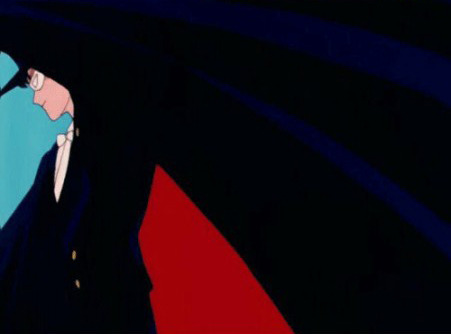
maybe i am too invested in barbie to even recognize that people have such negative feelings about her. maybe i have seen this premise done better in the lego movie, teen beach movie, barbie: life in the dreamhouse! (all of which genuinely love toys and kids/teen media and are not using them to sort out their own disgruntled feelings — and have a genuine belief that even flawed media bankrolled into existence can be real art, something gerwig seems so skeptical about that she lets her ambivalence about taking on this particular directorial gig become the driving tension in the story. how ... relatable?) maybe i have unresolved issues with greta's themes from little women and am now realizing how little she seems to get the things that matter to me, and we just need to part ways.
as anthony lane writes in the new yorker, "maybe the movie is for greta gerwig. and, by extension, for anyone as super-smart as her—former barbiephiles, preferably, who have wised up and put away childish things."
to that, i'd put a quote from c.s. lewis, whose work greta will soon try to get her hands around: "when i became a man i put away childish things, including the fear of childishness and the desire to be very grown up." the soul shudders at a narnia, a barbieland, a march family home, that are only notable for how "complicated" our feelings about them are supposed to be, and i think that puts my thoughts on greta's work into words.
now ... proust barbie, i would buy.
88 notes
·
View notes
Note
Out of curiosity, how would you go about writing a neuvi/furina fic? I agree that there is a lot of potential for really good fics but for some reason the fandom waters it down (pun not intended but cyno would be proud). However, I've noticed that with other ships in the fandom too. They have interesting potential but then I'll look for good food and get morsels 😭 of what I'm looking for. Like I have had to comb through some alhaitham/kaveh fics that were uh very different from canon characterization. And it's like I JUST WANT GOOD FOOD PLS.
hmm. i personally would be really interested not in shipping them, but in like. snippets of interactions throughout the ages, from establishing roles to settling in a routine to then how these respective roles are getting in a way of genuine contact. bc like there are points where they try to reach out, but it fails in a mundanely tragic way. like. in furina's note, she says she told him thousand times to go out and interact with "our" ppl. like she clearly was well intentioned and tried to be nice. but like. it didnt work! he never did go out and interact with humans until post AQ, when in lantern rite he says he was just indifferent before. bc like, from his perspective its not "his" people, and also its his boss, whose also his colonizer, being like "haha you should get out more lol!" ofc he was like "idk what she's even thinking about", which is what he says about her note. but furina both didn't know the vishap context and was kept in constraints of self-absorbed goddess role, so the way she tried to be nice would never work like that.
i think ppl focus too much on how furina suffered more than jesus and forget why, which is bc she had to play the role of an entitled asshole and she had to interact with others thru that role, despite being mortified at how horrible she sounds. this is why she now thinks he hates her and all her coworkers too. she never had luxury of being kind or nice to ppl before, and if you take that away, her character loses a lot of complexity.
i think itd be interesting to explore her trying to be good to ppl while trapped in an asshole attitude, and sadly fail.
if i was paid like 100 bucks to write them romantically, i think id write the retrospective i was talking before for early chapters, but then take one of two options:
either keep canon story and explore them interacting thru excrutiating awkwardness post AQ
or as more interesting option, id re-write AQ a bit to add their interactions and let some of these interactions actually connect. i'd also let furina find out the truth about sovereign and what it means in relation to archons stealing his power. also, i'd restructure canon confrontation so that neuvi takes focal point instead of traveler. and then i'd go ham with drama on that archon trial, but also re-do meeting with focalors bc gurl. talk to your humansona pls.
btw i strongly dislike fandom being like oh, furina\rizzley was the reason neuvi saved humanity, like nooo its missing entire point. he saved humans without any selfish reason to do so, in fact, against his motivation for revenge, making that decision about a single human ruins neuvi's character. so in this furina\neuvi case i'd make conflict like. they don't know if she's gonna survive is focalors dies, bc then choosing to save fontain becomes the-nonselfish choice for him again and she gets to be the one with agency to decide to risk it
14 notes
·
View notes
Note
Your opinion on Claudia and Claudia and Lestat?Apart from her early years and the arc of her depression after killing her first boyfriend, Claudia seems very well adjusted. It doesn't seem to me that she indulges in any more murderous sprees and her emotional "outbursts" don't even seem to be due to her state of "adolescent angst."
There is still a horror in the fact that she is a woman forever trapped in the appearance of a child, but Claudia's worst traits seem to be learned from her coexistence with Lestat and not the consequences of converting someone "too young".
It's funny because while Louis is the father she loved the most, it is Lestat that she imitates and resembles well.I think at some point she loved him and it's because of how betrayed she felt by Charlie's death that she started to hate him so hard, but I don't think Lestat ever cared about her beyond her role as the band-aid and then the poison in his relationship with Louis.
To be completely honest, it's difficult for me to talk about IWTV like this because I don't think they deliver on what they say they do and on what fans/viewers tell me they do.
Like this:
There is still a horror in the fact that she is a woman forever trapped in the appearance of a child,
She doesn't appear like a child, though, she appears like a young woman
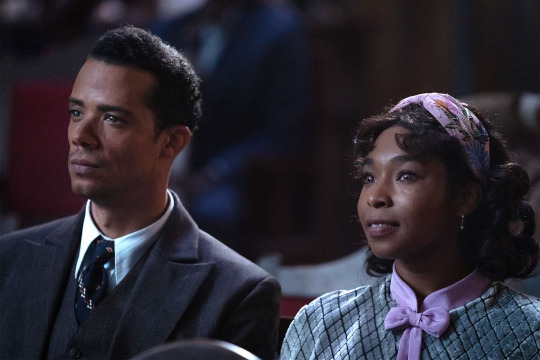
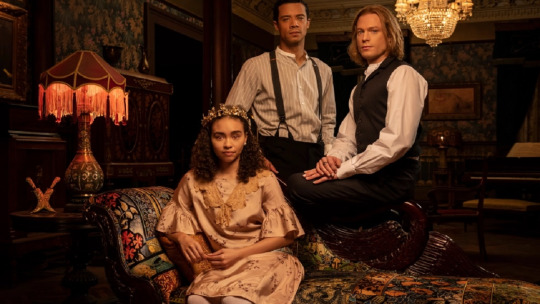
That takes away so much of the "horror" for me, I can't take her arc seriously. To me, Claudia is still Kirsten Dunst who conveyed the madness and the cruelty and the weirdness of being a child vampire wonderfully
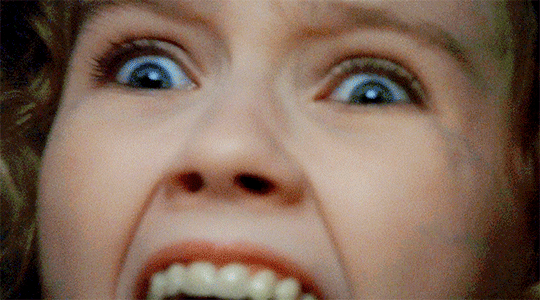
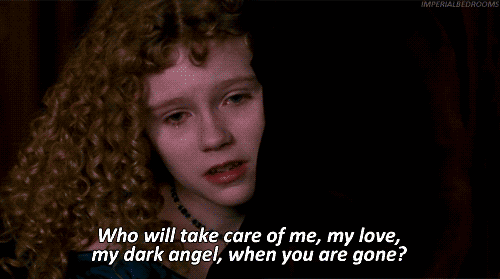
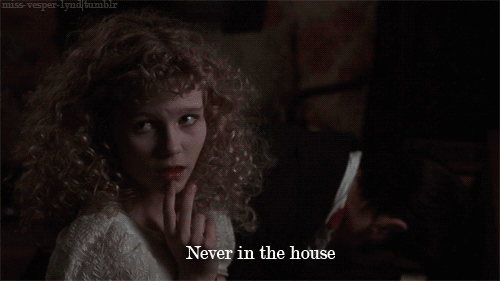
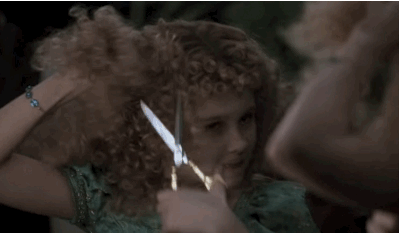
Lestat is still Tom Cruise
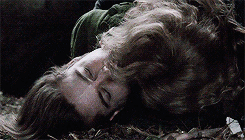
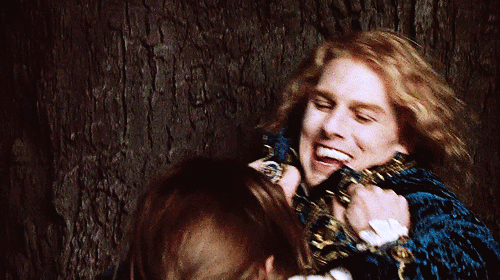
Her complex relationships with Lestat and Louis respectively,
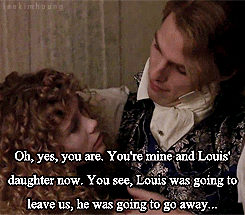
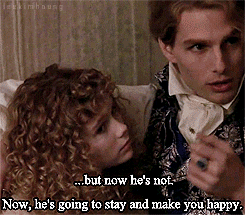
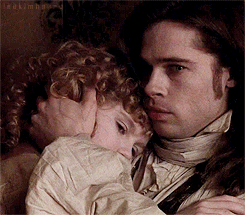
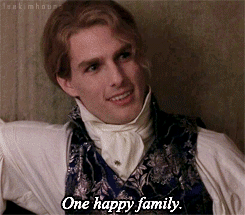
when I think of them, still comes from the movie if not the book
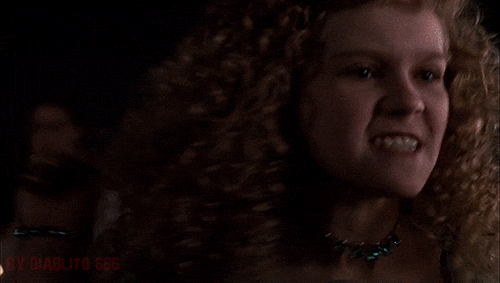
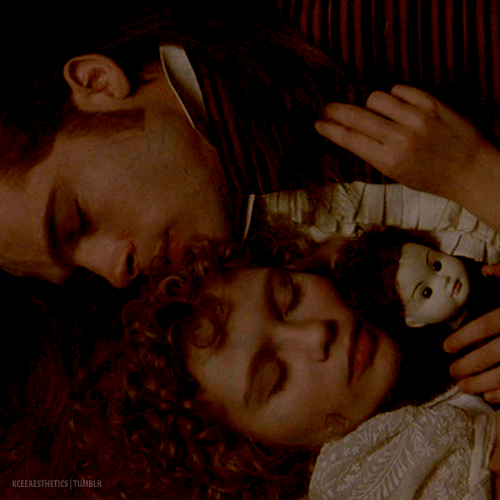
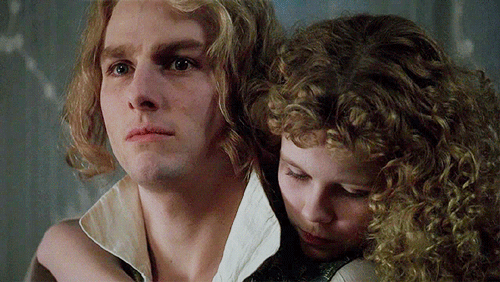
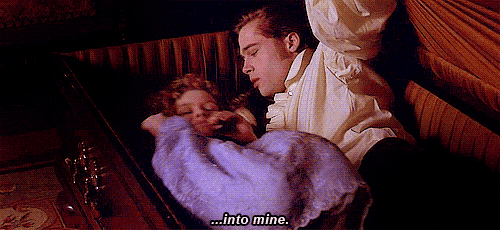
so this
Claudia's worst traits seem to be learned from her coexistence with Lestat and not the consequences of converting someone "too young".
I mean, what are we talking about here? Do you mean her excitement with regards to hunting? Do you mean her coldness when she "murders" Lestat i.e. writing his name down in his own blood? This is cruelty she's learned from Lestat? Is it particularly cruel in the context of vampirism in this world or is it cruel in the context of Louis' morality when Louis murdered an innocent human hallucinating Lestat and let a woman get decapitated because he doesn't get involved with "human affairs"? Why is it coexistence with Lestat that shaped her and not what she had to suffer with Bruce?
It's funny because while Louis is the father she loved the most, it is Lestat that she imitates and resembles well
I mean, I guess? Again, with the show, I'm not really sure who these characters are with the exception of I suppose Louis, although the point is meant to be that who tells the story gets to shape the personalities/motives/behaviours of the characters so Armand's Lestat is supposed to be very different from Louis' Lestat but I didn't think there was much of a difference so I kind of just shrug at that and then when it comes to Claudia, really what I get the most is that she's searching for a vampire community for whatever reason (which ... OK, and Lestat wanted a companion so I guess that's similar) and then it becomes about how she wants to be taken seriously, which is like ... OK? I think it would make more sense for her to want to reclaim agency in her life since she was turned against her will, held captive by Lestat when she tries to leave, then is held captive by Bruce when she does leave so she wants some control over her life but the EPs went with "being taken seriously".
I don't know, I'm ranting. My point being, I think it's all flimsy and superficial.
8 notes
·
View notes
Text
cast for my fanfiction

Riko - main character, jr soviet pionneer, she takes many aspirations from the kremlin agency due to the adoration of her mother and her friends. She and Reg sneak into P-3s car until they were attacked in the air and crashed into a nearby office building. After P-3 left them alone without knowing, Riko and Reg braved the hostile machines and out into a changed world. From there, they journey to find what is going on.
Reg - loyal protector, “robot”, He was built by Dr. Sechenov to protect and care for Riko when she is by her lonesome. After their initial meeting, the two became best friends and swore to stick by each other no matter what. When their inciting incident occurs, Reg protects Riko through combat techniques, extendable arms and in a last ditch effort, incineration cannon. However, the more Reg goes on the journey, the more he starts to learn more about himself in the process.
Nanachi - Fluffy bunny, tragic experiment, They were once a human, living by life homeless and starving thanks to the carelessness of the soviet government. One day, they found a poster promising a safe haven and happiness beyond imagination. Hesitant at first, Nanachi decides to join the program. There, they meet Mitty, a girl who is the brightest ball of joy anyone has ever seen. Throughout the days, Nanachi and Mitty have grown closer, seemingly to showing a deeper sort of affection. Till all was taken away. Nanachi and Mitty were admitted to an experiment, by testing with polymer, their genetics were going be spliced with those of animals. The procedure was agonizing, Nanachi suffered but ended up changing form to that of a rabbit. Mitty wasn’t lucky, the procedure was botched and Mitty was turned to an ever-suffering mound of flesh. She was later put down. Not a day goes by when Nanachi wishes to exact revenge on the very government that tormented her and those they loved. Maybe that day will come.
Faputa - blessed daughter, cursed princess, Faputa was born from an egg that was formed from her mother, a young girl named Irumyuui who was taken in after being found stowing away in a shipping container. Faputa made life hell for the employees of the pavlov complex, until someone new showed up. She first observed this new individual cautiously, before getting more and more closer to them, finally they have started being well acquainted with each others company. One day, something festered inside her, she doesn’t know what it is, but it happens every time she was around her friend. Whatever it was, she was glad it meant to be around her friend. One day, a man took her friend away without warning. She waits days for her friend to comeback, but they never did. She became heartbroken, sad, violent. Suddenly one day. The doors locking her in her cell have opened wide, all the scientist are dead, machines and monsters roam the complex. She doesn’t know what happened, but she concurs that something big just happened.
Ozen - the immovable, commander, second in command in the KGB police, Ozen exacts order through great strength and terror. Outside of her job, she is good friends with Lyza and P-3. Especially with Lyza, she mentored her when she ways a teen and cared for her when like she were her mother (because Lyza’s actual parents died during the brown plague). Her role during the machine uprising was to seek Riko and take her to safety, but to also keep close tabs on agent P-3.
extra info: Ozen and Lyza were immigrants from Japan who moved and worked in the Soviet Union after the brown plague had decimated Japan, along with other eastern countries.
more coming tomorrow
#made in abyss#atomic heart#tw russia#info dump#riko made in abyss#reg made in abyss#nanachi made in abyss#Faputa Made in abyss#Ozen made in abyss#Lyza made in abyss#Riko#Reg#nanachi#faputa#ozen the immovable#lyza the annihilator#crossover#fanfic
14 notes
·
View notes
Note
For the meta for writers questions, 1, 3, 8, and 20!
Tell us about your current project(s) – what’s it about, how’s progress, what do you love most about it?
Ah, the Ace Longfic! Which still doesn't have a title to itself. It is supposed to be like ten chapters but will probably be more than that, and I'm in chapter four! I'm trying not to talk about it too much online because then I won't want to write the actual thing, but without spoilers, it's a series of solo adventures for Ace that explore her parallels with/similarity to the Doctor. I'm trying to actually write full adventures and I'm having fun coming up with interesting characters for her to meet. Plot less so, but we'll get there.
Since she is on her own and filling the Doctor's shoes, I've found she works less and less well as a POV character. So I'm writing from the perspectives of people she meets along the way, which also allows me to show how she's growing and changing and getting weirder (as she should). My current POV character is a wet-behind-the-ears military officer posted to an isolated space station where secret scientific experiments are being done. I'm sure you can guess whether the scientific experiments go wrong or not. My young officer has to step up and make complex moral judgment calls (which she does not want to do but discovers she will if she has to) when both her superiors get their brains taken over.
3. What is that one scene that you’ve always wanted to write but can’t be arsed to write all of the set-up and context it would need? (consider this permission to write it and/or share it anyway)
Hahaha I always do just write it anyway! That's why I have so many ficlets. The things I dream about and don't write are the big sprawling daydream AUs that won't distil into one scene.
Oh fine OK I do have one key scene but the reason I haven't written it is because no one will have any idea what it's all about. Remember you asked for this! This is from the viewpoint of an agent of the Gallifreyan CIA who's been spying on the Seventh Doctor during the events of the novel Set Piece.
--
It's a shame to see a good agent--never reliable, but brilliant at his best--end up in such a state. A shame, but not surprising. He's not the first agent to end his career like this and he won't be the last, especially being a renegade as he is. They know from his file that nine centuries' hard living has put him in his seventh body already. Most of his career he's believed he was defying the Agency. Some of it he actually was. They've retrofitted quite a bit of their timeline planning around his entirely unauthorized interventions--and it's always turned out better than you'd hope. Now he's stranded, sponging off an old friend, health broken, nerves shot all to pieces. He's lost that TARDIS of his--gossip says they'd grown hopelessly into each other--if she's dead he'll have a horrendous psychic wound. Perhaps that's even the root of what ails him; perhaps that's the reason he's drinking French wine laced with opium at ten o'clock in the morning local time. Not much else he can hope to do for it, not without a Gallifreyan medic. And he won't come home, they know that too. He'll wither away there, jumping at shadows, country servant-girls pitying him, before he'll come home and be properly looked after. Some of the agents think he can't anymore; after so long away, they say, he can't take his place in Gallifrey's telepathic web. The closest he can get, now, is the buzz and chatter of human voices around him. They note how he haunts the kitchens. He's made a wreck of his lives and fortunes, probably his ship as well. He's reduced to drifting about in the local skirmish called the Franco-Prussian War--a purely human conflict, not even a branch of the War, which would be something--and he isn't even doing anything there. He's serving as a dreadful warning to young agents: the renegade life may seem exciting but this is how it ends. There's some suggestion they should inform Cardinal Braxiatel. If you want to speak to him, you should do it soon. Before nineteenth-century drugs and living on his nerves and the loss of his ship and the unknown wound in his shoulder he keeps rubbing take their toll. Even the humans say he isn't quite all there. And wherever else it is he's going, it's somewhere the CIA can't reach.
--
It's a weird book, Set Piece. Don't worry, Seven has a very complicated plan going behind all this. But he does have something of a breakdown. It ends up being quite cathartic for him actually. (He's drinking the drugged wine because someone else is drugging it and he doesn't want them to know that he knows. He claims.)
8. Is what you like to write the same as what you like to read?
I like to read the sort of thing I write, certainly! (Although there's some things I've written that I'm pretty sure if someone else had written them I'd find hopelessly saccharine.) But there's also things I like to read that I could never write. Novel-length fics, for sure, I really appreciate but don't write; I also love a good pastiche of a book series with a strong authorial voice, but avoid doing them myself, after a really harrowing experience doing cod-Pratchett. (Although I had a really fun time doing that Stevenson-in-space bit. Maybe I just need the amount of distance provided by an AU to enjoy doing author pastiches? I should try space!Aubrey-Maturin sometime and see if that'll do it.)
20. Tell us the meta about your writing that you really want to ramble to people about (symbolism you’ve included, character or relationship development that you love, hidden references, callbacks or clues for future scenes?)
These questions assume I don't shove all that in the notes already! :P
Oh yeah, I did do a bit of research for that Hornblower fic that I forgot to put in the notes! I wondered whether the superstition that it's bad luck to toast in water was old enough for the characters to think of it. The few minutes of research I did were pretty inconclusive, actually--one source did say it originated in the Royal Navy but didn't say when, which was not very useful to me, but I decided it at least sounds old enough that I could project it back to the 1800s. Apparently the superstition is specifically that someone who drinks a toast in water will die by drowning, which... well, both of them avoid that at least....
6 notes
·
View notes